
“WILL YOU HAVE ALICE-BLUE SUITS TRIMMED WITH WHITE BRAID?”
This eBook is for the use of anyone anywhere in the United States and most other parts of the world at no cost and with almost no restrictions whatsoever. You may copy it, give it away or re-use it under the terms of the Project Gutenberg License included with this eBook or online at www.gutenberg.org. If you are not located in the United States, you'll have to check the laws of the country where you are located before using this ebook.
Title: The House of Delight
Author: Gertrude Chandler Warner
Release Date: July 20, 2020 [eBook #62714]
Language: English
Character set encoding: UTF-8
***START OF THE PROJECT GUTENBERG EBOOK THE HOUSE OF DELIGHT***
| Note: | Images of the original pages are available through Internet Archive. See https://archive.org/details/houseofdelight00warn |

“WILL YOU HAVE ALICE-BLUE SUITS TRIMMED WITH WHITE BRAID?”

| CHAPTER | PAGE | |
|---|---|---|
| I | The New House | 3 |
| II | At the Seashore | 24 |
| III | Mr. Delight’s Surprise | 45 |
| IV | The Picnic | 64 |
| V | The Christmas Tree | 83 |
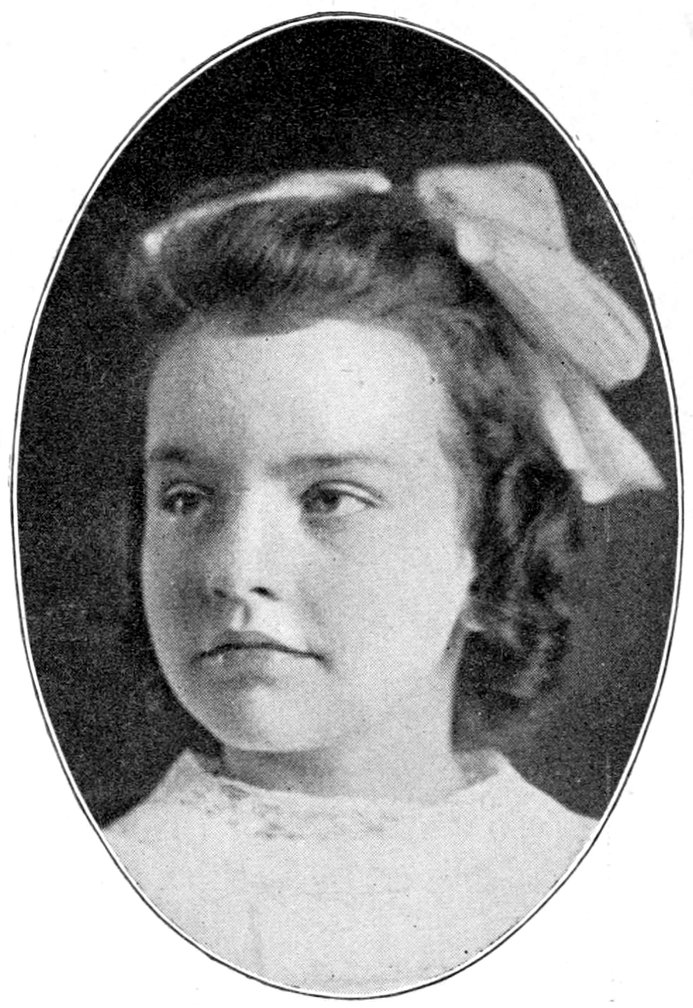
Betsey, a real little girl, who takes the parts of
Madame Bettina, the French dressmaker
Mr. Betts, the carpenter, and
Dr. Betson, the family physician
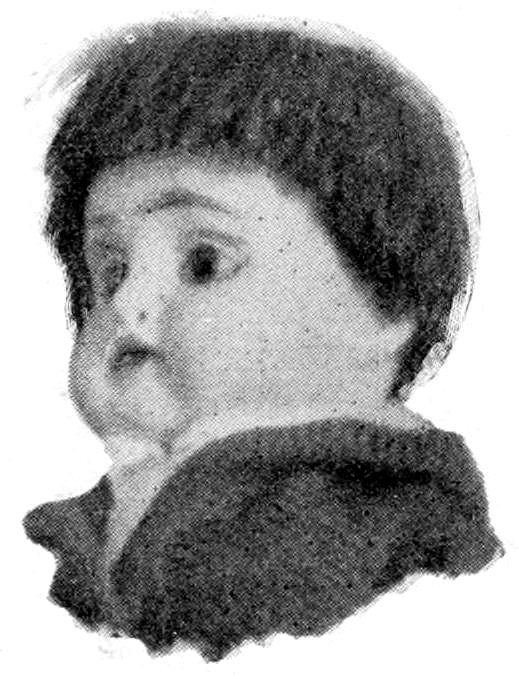
William Delight, a bisque doll, just as long as Betsey’s hand
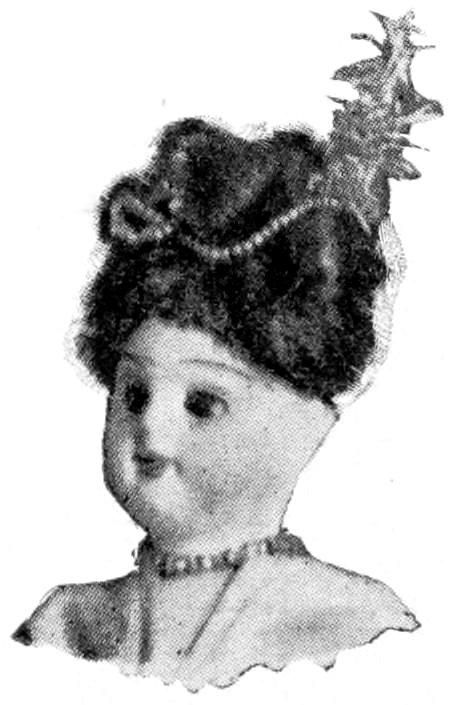
Edith Delight, his wife, a five-inch bisque doll
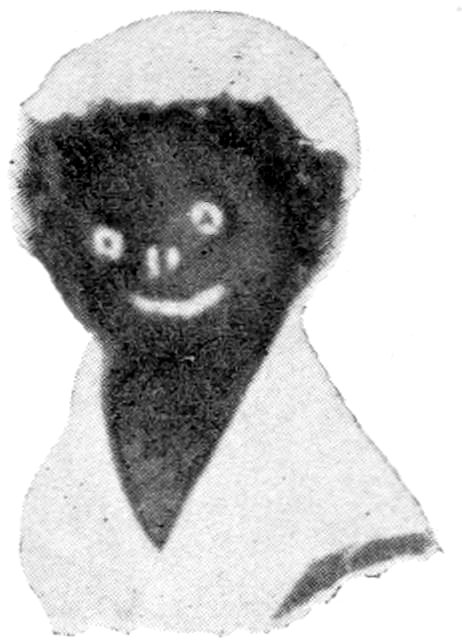
Dinah McGinty, the colored cook, a rag doll
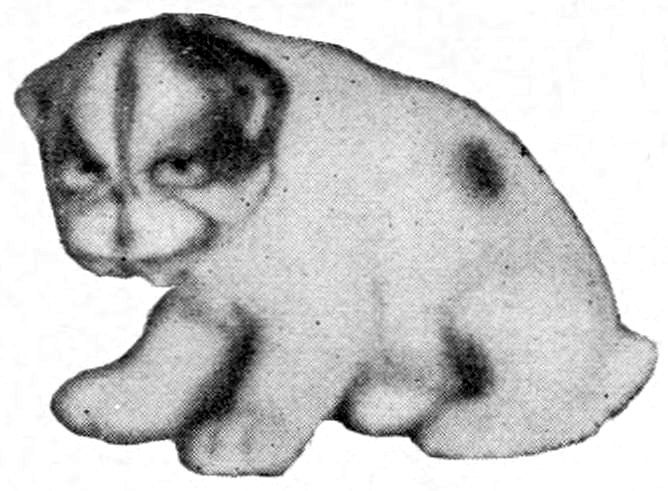
Dumpling Delight, the china dog
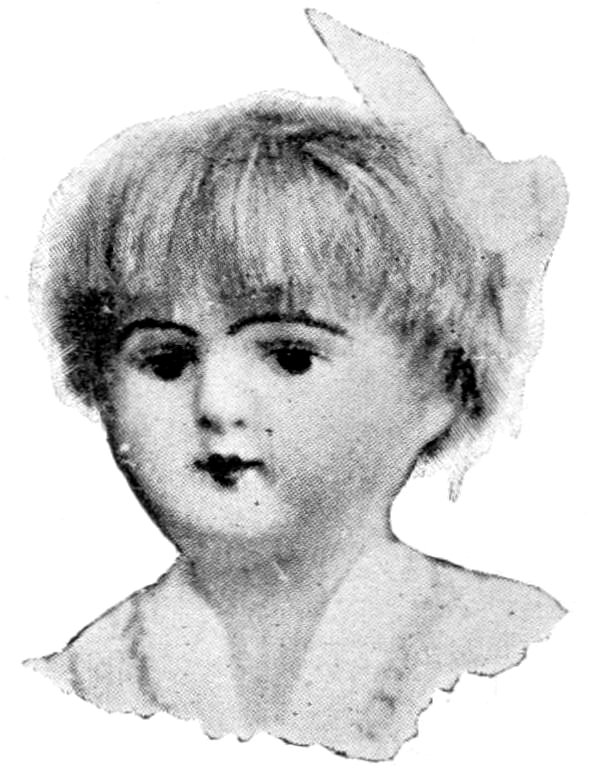
Prudence Darling, Edith Delight’s married sister
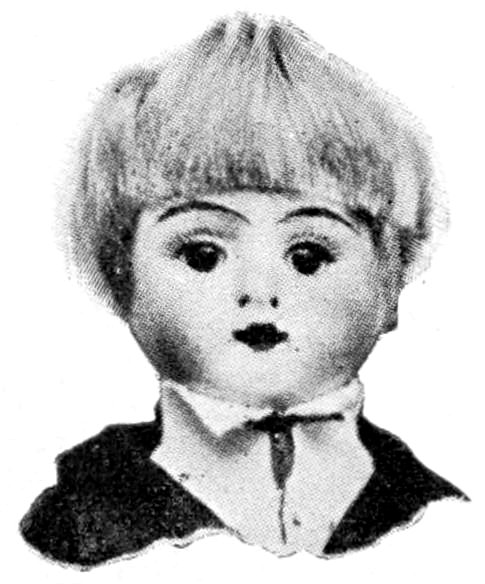
John Darling, Prudence’s husband
| Mr. and Mrs. Avery | Betsey’s Father and Mother |
| Tom Avery | Betsey’s Brother |
| Margaret Avery | Betsey’s Cousin |
| Dr. Lawrence | Betsey’s Doctor |
| Norah | Betsey’s Mother’s Cook |
| “Will You Have Alice-Blue Suits?” | Frontispiece |
| Persons in the Book | |
| “Will You Have a Breaded Chop, My Dear?” | 4 |
| “That is Quite Satisfactory to Me” | 14 |
| She Always Stood Mr. Delight Up in His Shirt-Sleeves | 22 |
| Soon Mr. Delight Came Striding Back | 34 |
| “Remember de Fish, Mr. John” | 38 |
| “Don’t Stir Up the Water so Much Down There” | 42 |
| So Mrs. Delight Went Down in Great Astonishment | 62 |
| “He Sure Do Look Mighty Stylish A-Driving Dat Kerridge” | 68 |
| “Take Up a Sandwich, Mrs. D. and Look Pleasant!” | 76 |
| He Left a Print of Each Tiny Footstep | 90 |
| “Dinner Am Served, Sah” | 96 |
Betsey was a curly-headed little girl, nine years old, who played with her dolls in the most interesting way you ever saw. Little Mrs. Delight, with her soft brown hair and beautiful brown eyes, was Betsey’s very dearest doll, and she played most of the time with her, and her charming little husband, Mr. Delight. But Betsey’s sister Anne, who was away at school and who was much too old to play with dolls any more, had given Mr. and Mrs. Darling to Betsey, for it did seem too bad to keep them packed away in their dark, stuffy box.
Now, Betsey didn’t call herself xiithe dolls’ mother, for they were all grown up, and much older than she was already. And they seemed to need a new chair or a new bed so very often, that a carpenter was necessary most of the time. So whenever Mr. Delight wished to order new furniture, Betsey called herself Mr. Betts, and talked exactly like a carpenter. When Mrs. Delight needed new dresses or new curtains, Betsey called herself Madame Bettina, and talked as nearly as she could like Mother’s French dressmaker. And when any of the dolls were sick, Betsey at once took the part of old Dr. Betson, and talked gruffly with them about tonics and pills.
She talked for each of the dolls, too, and if you had listened in the next xiiiroom, you would have said that at least three or four people were talking.
Betsey really was such a very skilful little carpenter and seamstress, that you will find only five pieces of furniture in the pictures that she did not make all alone by herself. See if you can find the five things. She even made Dinah, the colored cook.
Betsey always liked School-time, and Bed-time. And she was a very good little girl about Errand-time and Dusting-time,—considering everything. But, do you know, I really think that most of her best lessons in patience and neatness were learned in Play-time!
Mother paused on her way past the playroom door, and listened. She knew Betsey did not have company, and yet there was a sound of three voices,—first a pleasant deep, bass voice, and then a pleasant silvery little voice, and then a pleasant low bark. Mother pushed open the door very softly and looked in.
There lay Betsey on the great fur rug, with her curly head propped up on her hand. Before her stood the low, broad Morris chair, divided into two rooms. Mother knew it must be a bedroom at the back, on account of 4the funny bed made of a box-cover, and covered with a gay patchwork quilt, Betsey’s very first piece of sewing. And nobody could possibly mistake the dining-room in front, with its large red pasteboard table, and little Mrs. Delight at one end, and her cute little husband at the other. Black Dinah stood by the table, smiling as usual, ready to serve a large platter of salad, and Dumpling Delight barked gruffly once in a while, because there were so many tantalizing smells in the air.
“Will you have a breaded chop, my dear?” asked Mr. Delight.
“Yes, thank you, William. Will you have some of the creamed oysters?”
“And some of dis yeah lobster salad?” inquired Dinah.
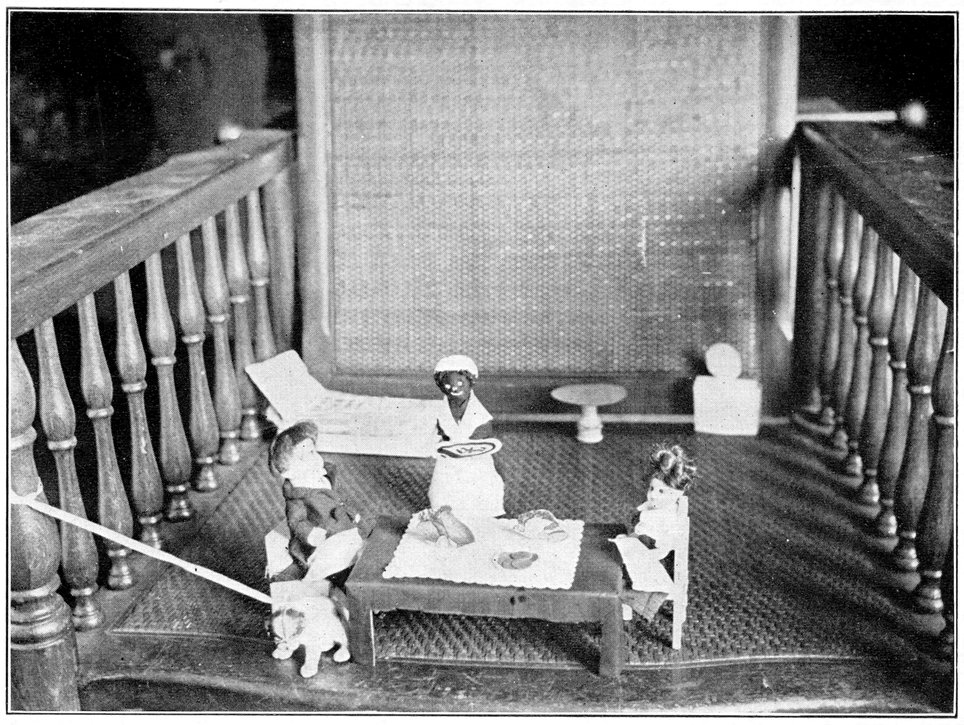
“WILL YOU HAVE A BREADED CHOP, MY DEAR?”
5(“Mercy,” thought Mother, behind the door, “what a dinner!”)
“I’ll tell you what I wish,” said Mr. Delight with a deep cough, “I wish we could invite your sister Prudence and her husband to spend a week with us.”
“Where in name hebben would you put comp’ny, now, Massa Willyum? I ask you dat,” demanded Dinah.
“Yes, William!” echoed Mrs. Delight. “This house is certainly a tight fit for three, and with two extra ones!”
“I wish I could afford a larger house,” said Mr. Delight in a worried tone.
“My dear husband!” exclaimed Mrs. Delight. Betsey had to sit up straight on the rug and take Mrs. Delight around the table to kiss her 6husband affectionately. “I didn’t mean a word I said, William; I really didn’t.”
“There, there, my dear, I know you didn’t,” replied Mr. Delight soothingly.
But Mother suspected that Mr. Delight was worried just the same, so she softly pulled the door together and tiptoed away to the telephone. She smiled to herself as she called up the carpenter-shop.
“I want you to make my daughter Betsey a doll-house, Mr. Jones,” she said. “Just like the one you made for your little girl,—that had four rooms and six windows, and a big door between the rooms. And can you get it done for Betsey’s birthday? In four days?”
7“I will get it done, paint and all,” promised Mr. Jones. And he did.
On the morning of her ninth birthday, Betsey came smiling to breakfast, expecting to see a pile of dainty white parcels at her plate.
“Your birthday present is up in the playroom, Betsey dear,” said Mother with a kiss.
“I’m afraid she won’t like it,” said Father.
Now, whenever Father said that,—“I’m afraid she won’t like it,”—Betsey’s present was sure to be very large and wonderful. Once it had been her shiny bicycle, once her new blue playroom, and once her darling black pony. So Betsey finished her breakfast in great excitement, hurried upstairs to the playroom and pushed open the 8door. And there it stood in the center of the room,—the dear little house, painted snow-white inside and pale green outside,—with four rooms and six windows and tiny window-sashes, and the cunningest threshold!
Betsey rushed over to the dainty little cottage, put her head in the little dining-room and looked through the double doors into the drawing-room. “Just to see how it would seem to live here,” she thought. And then her eyes fell on a square white card dangling from one of the little window-sashes.
“THE HOUSE OF DELIGHT” said the card. “To Betsey, from Father and Mother.”
“I’ll say thank you before I begin to play,” decided Betsey, tossing back 9her curls and clattering down-stairs at a great rate.
“Here’s that child!” exclaimed Father. “I was afraid she wouldn’t like it!”
“O but she does!” shouted Betsey, whirling around in the middle of the room. “Mr. Delight has wanted to move for the longest while!”
“What do you say, Mother,” said Father with a twinkle, “if we excuse Betsey today from doing any hard work?”
“Betsey can simply make her bed,” agreed Mother.
So Betsey whisked the white covers over her little brass bed as smoothly as she could (with a perfectly new doll-house waiting), and hurried back to the House of Delight.
10Little Mr. Delight was sitting in his law office behind the radiator. Betsey picked him up, put on his gray derby hat, and walked him rapidly across the room to the Morris chair.
“Edith, O Edith!” he cried excitedly. “My salary has been raised to a million dollars a year! Now we can move into a new house!”
“How perfectly lovely!” cried Mrs. Delight. “Can’t we buy one directly?”
“We certainly can, my dear,” replied Mr. Delight. “We will go down right away and see Mr. Betts, the carpenter, and see what houses he has on hand for sale.”
Betsey slipped off the excited little gentleman’s business coat and put on his black one with the long tails, thrust 11his cane under his arm, and propped him up against the chair-back to wait for Mrs. Delight, who was much slower in dressing. Betsey selected a white silk blouse and tailored skirt for Mrs. Delight, and opened her gay Japanese parasol. Then, while the happy dolls were taking the trolley ride to Mr. Betts’ carpenter-shop—(really standing stiffly all the time against the chair-back)—Betsey hustled the untidy shop into order. Then she drew the table over to the window, settled her fat tube of paste, her bottle of glue, her scissors and scraps of satin on it, and sat down before it, very importantly, as Mr. Betts, the carpenter. And what a smiling carpenter she was!
“Good day, Mr. Betts,” said Mr. Delight (quite out of breath with the 12stairs), “we want to buy a new house.”
“What kind of a house?” asked Mr. Betts thoughtfully, setting his little customers up against a pile of books.
“A moderately large house, Mr. Betts,” replied Mr. Delight, “that is well-built,—for myself, my wife, and a colored cook.”
“Aha!” exclaimed Mr. Betts. “I have the very house!”
“Shall we take a look at it, my dear?” said Mr. Delight, offering his arm to his wife. And presently they stood in Mr. Betts’ brand new house, that was painted snow-white inside and pale green outside, that was well-built and just right for three people.
“O what a lovely house!” exclaimed Mrs. Delight.
13“How much is it?” asked Mr. Delight, taking out his check-book.
“It is $15,000, but it is very well-built and—”
“That is quite satisfactory to me, Mr. Betts,” said Mr. Delight, calmly writing his check for $15,000.
“And you can supply us with furniture, I suppose?” asked Mr. Delight, passing the check to the obliging carpenter.
“Everything from a rocking-chair to a telephone,” said Mr. Betts happily.
“Betsey!” called Mother’s voice.
“Here is a present from Aunty, for your birthday,” said Mother when Betsey opened the door.
Betsey sat right down on the stairs, smoothed out the long, pink ribbon carefully (for she was sure to need it 14when she became Madame Bettina, the French dressmaker), and shook out her present. It was a tiny sideboard with shelves for Mrs. Delight’s china, with fascinating doors that opened and shut, each set with a little silver-colored knob.
“O for my new house!” cried Betsey. “Isn’t it the luckiest thing, Mother, for I’m afraid Mr. Betts doesn’t keep sideboards!”
Mother laughed and waved her hand at the happy little figure.
“Now, as long as the house is decided upon,” said Mr. Betts cheerfully, taking one of the little millionaires in each hand, and sitting down at his work-table, “I suppose the next thing is furniture.”
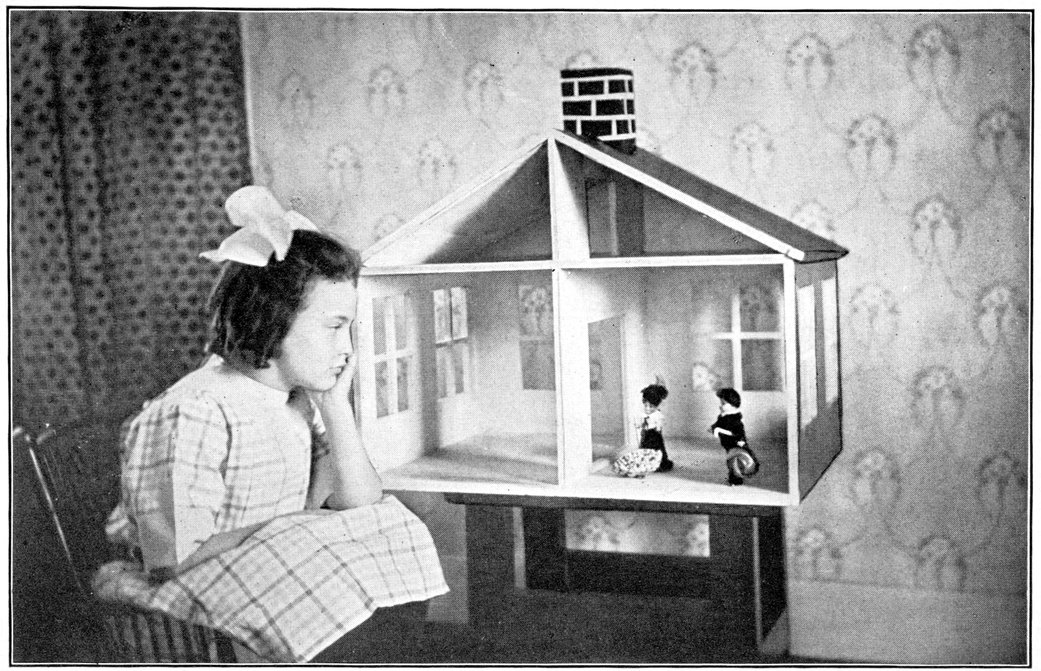
“THAT IS QUITE SATISFACTORY TO ME, MR. BETTS,” SAID MR. DELIGHT.
15“We want everything,” declared Mr. Delight recklessly. “We want a piano, and a window-seat, and a sideboard—”
“I have a sideboard that came in this morning,” interrupted Mr. Betts, rolling it out directly.
“O isn’t it sweet?” said Mrs. Delight, clasping her hands. “Dinah and I will paper the shelves with that scalloped paper that comes on purpose. Think of it, William, full of our wedding china!”
“Betsey! O Betsey!” called Tom, plunging up the stairs. “See what I’ve got.”
Betsey turned around and examined with interest a piece of gilt molding about six inches long that Tom held out.
“See, lay it on this side, and presto! it’s a sofa! You can have it.”
16“O Tom, how kind of you! I’ll make a huckaback pillow for it,—pink and green. It will be too dear for anything!”
“Hum,” thought Tom on his way down-stairs. “I didn’t think she’d be so awfully pleased with a little thing like that. Maybe I could saw her out a little chair on my jig-saw—I wonder?”
And in a few minutes there was a strange, buzzing sound down cellar, that kept time to the hum of Madame Bettina’s tiny sewing-machine upstairs. For it was Madame Bettina that had to make the sheets and pillow-cases and net curtains, and all the things which are hardly in a carpenter’s line.
“How can I make a telephone?” 17puzzled Betsey. And she gazed thoughtfully at her box of beads.
“Aha!” exclaimed Mr. Betts suddenly, taking two large silver beads from his box.
“Ho-ho!” he laughed, rummaging excitedly in the closet where he kept his smooth pieces of kindling wood.
“Yes, Mr. Delight,” he remarked calmly, “I will personally see to it that the telephone is put in the very first thing, so you won’t lose an important call.” He began to paint a small piece of wood a rich, deep brown, with water colors.
“Another small piece of wood for a battery box,” murmured Betsey, whanging away at an obstinate nail. “The two silver beads for bells, a two-pointed tack to hold the receiver—a 18green cord—a roll of black paper stuck into a black bead for a receiver—. Now, what on earth for a speaking tube?”
Speaking of tubes! Mr. Betts triumphantly took the cap from his tube of paste, and with one resounding rap of his hammer, nailed it securely in the exact center of the new telephone!
“Hullo, up there!” called a deep voice at the foot of the stairs.
“Come up, come up!” called Betsey, running to open the door for her father. “See the telephone.”
“Well, quite a telephone, indeed!” said Father admiringly. “Now, what can you do with this?” He laid a polished wooden stamp-box in her hand.
Betsey thought a moment. “A 19clock. Glue the cover down, paint a lace, stick on a pendulum—”
“And hang it on the wall!” finished Father. And he smiled over his shoulder to see Betsey change so suddenly into Mr. Betts, who must somehow sell to Mr. Delight a Grandfather’s clock,—solid oak, keeping perfect time, and extremely reasonable in price.
“Do you want to live in your new house at once, or wait until everything is done?” asked Mr. Betts.
“O live there at once, William!” pleaded Mrs. Delight. “I am just crazy to hang the curtains!”
“O.K.,” said Mr. Delight. “You get Dinah to come over to help you, and I will superintend Mr. Betts and his moving men.”
20Soon the tiny drawing-room was in great confusion. Dinah and her mistress sat among great piles of net and lace, running the dainty curtains on their poles, tying them back with wide rose-colored ribbons, and getting up and down on the step-ladder to arrange the folds. Suddenly, as Betsey swung Mrs. Delight gently from the little ladder, a tiny elastic between Mrs. Delight’s arms snapped, and down fell her round right arm on the soft new carpet!
“Massa Willyum!” shrieked Dinah. “Miss Edith done broke her arm a-falling off dis yeah step-ladder! Telephone for de doctor, wid de new telephone!”
Mr. Delight rushed distractedly to the telephone. “Dr. Betson, please 21come immediately! Yes, my wife has broken her arm. It’s very serious indeed!”
“I will come just as soon as my motor can get there,” replied Dr. Betson.
Dinah was wringing her hands and crying when Mr. Delight hurried into the drawing-room.
“Don’t feel so badly, Dinah,” said Mrs. Delight bravely. “Dr. Betson is the best surgeon in the world.” And as she smiled a little, Dr. Betson rang the bell violently.
“Well, well!” he said heartily, kneeling down to examine the break. “Don’t worry, Mrs. Delight, because I can fix this arm in a trice! Just spread a few blankets on the floor for a comfortable bed and I’ll go to work.”
22Betsey pulled a piece of new elastic (kept for just this purpose) out of her work-box, threaded Mrs. Delight’s arms on, and tied them tight. And then to make her work look quite professional, she bandaged the right arm beautifully with cheese cloth.
“Is it possible the arm is set?” asked Mrs. Delight as the doctor put up his instruments (a ribbon-runner and a pair of blunt scissors).
“All done, Madam,” declared Dr. Betson. “This is a very fortunate kind of break. Now that it is properly set, you do not even need to be careful. I would suggest that you take a good rest, however.”
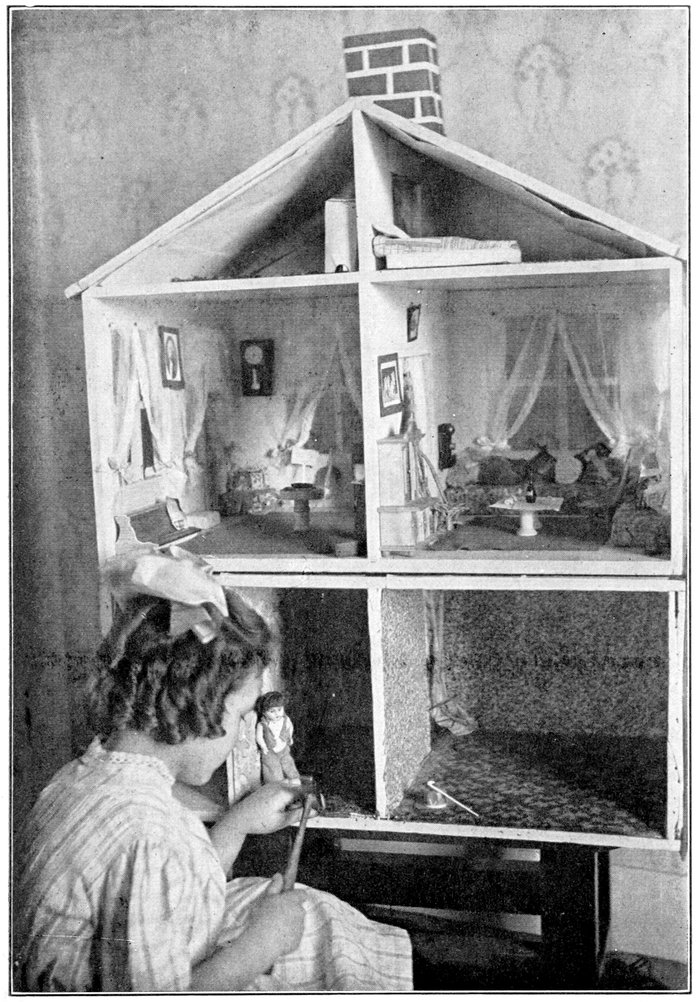
“SHE ALWAYS STOOD MR. DELIGHT UP IN HIS SHIRT-SLEEVES, TO SUPERINTEND THINGS IN GENERAL”
23“Indeed she will!” agreed Mr. Delight shaking hands with the gruff doctor. He was still quite pale. “Now, as soon as I can move Mrs. Delights bed up to her room, we will all go to bed, for we are very much exhausted with moving.”
Betsey carefully slipped on Mrs. Delight’s long, lacy night-dress, and tucked her in gently, and soon she was asleep.
And soon Mr. Delight left Dumpling asleep, and tiptoed up to bed, and soon he was asleep. As for Dinah, she was asleep in two minutes. So the tall, shiny clock on the wall ticked through the night alone, for Betsey crept happily into her own white bed, and fell asleep herself, for she had worked hardest of all!
“What are you making, Betsey?” asked Tom, one hot July day.
“A cottage,” said Betsey.
“Whew! There’s nothing small about you! What do you want of a cottage when you’ve got a new doll-house?”
“Mrs. Delight has to have a summer home, hasn’t she?” answered Betsey with dignity. “O Tom, dear! Could I borrow your train of cars? The Delights want to go to the seashore.”
“You can have it. I don’t want it any more.”
25“O thank you, Tom. I don’t suppose you’d want to lend that little suit-case—that Uncle John gave you full of candy, would you?”
“That,” said Tom, solemnly making a great bow, “you may have, too. What do I want of a doll’s suit-case?”
“You’re an old dear,” said Betsey affectionately. “Now let me think what else I need to make before the families can start for the beach.” She cut a large window in her pasteboard cottage as she spoke.
“How many families are going?” inquired Tom politely.
“Two,” said Betsey, carefully marking her window-sashes. “Mr. and Mrs. Delight, and Dinah and Dumpling, for one family, and Mr. and Mrs. 26Darling for the other. Try to think, Tom, what I ought to make.”
“Are your families going swimming?” asked Tom.
“O yes, indeed, every day.”
“Then I suggest that you make bathing-suits.”
“Of course! How stupid of me! Here I am, planning too much about trains and cottages, and not at all about clothes!”
And Tom went down-stairs, just as Mr. Betts, the carpenter, finished his cottage, and changed into Madame Bettina, the French dressmaker.
“O Madame Bettina!” said Mrs. Delight all out of breath. “We want some bathing-suits made. We’re going to the seashore!”
“That is ver’ good,” said Betsey, 27with Madame Bettina’s French accent (just as Mother’s dressmaker talked). “Will you have Alice-blue suits trimmed with white braid, with charming bath caps to match?”
“That sounds very pretty,” agreed Mrs. Delight. “My sister doesn’t know yet that she’s going, so hers is a great surprise. Make hers blue and mine black, so we can tell them apart, and Dinah must have one too.”
“I shall send them tonight, surely,” said Madame Bettina, getting to work in good earnest, for it is not every dressmaker that can make five bathing-suits in one day. She cut here and snipped there, and ran her machine at a great rate.
“Betsey!” called Mother above all 28the noise. “Come to the head of the stairs a minute.”
Betsey stopped her noise obediently and opened the door.
“Tom and I are going to Boston at ten o’clock. Norah will take care of you. And you can ask Mary to come over to play this afternoon, if you want to.”
“I don’t need Mary, Mother!” cried Betsey laughing. “You see with Mrs. Delight’s company I have my hands full already.”
“Very well,” said Mother laughing too. “Now what do you want me to bring you? I’m going to take your gold thimble in to be straightened where the chair rocked on it.” She held up the tiny blue box.
“O Mother dear! If you’ll only 29take the thimble in something else, and give me that thimble box, you don’t have to bring me one thing.”
“What do you want it for?” asked Mother in a puzzled tone.
“A camera. It’s just the size. I’ll cover it with black oilcloth and make a little, black carrying case just to fit, and Mrs. Delight can take it to the beach.”
“Here is your camera, then,” laughed Mother, tossing it up the stairs into Betsey’s two hands.
“Good-bye, Mother,” sang Betsey, bustling back into the playroom. “Ding-ling! Hello! Give me three-five-one, please.” (This in Mr. Delight’s pleasant deep voice.)
“Hello, Mr. Betts. Can you make me a camera to take with me to the beach?”
30“I can, sir. I will send it up with the suit-case, and bag, and fish-pole.” And Mr. Betts hastily got out his glue and heavy paper and thin sticks of wood, and soon finished a gentleman’s hand-bag, lettered “J. D.” (for John Darling), a tiny black camera, and a long, slender fish-pole.
“There!” said Betsey to nobody in particular. “Here is where the beach will be.” (Setting up the new cottage.) “Here is the station.” (Setting up the train of cars.) “And here are all the new things to be delivered.”
She packed them into a tiny express cart drawn by a brown horse, took a last look at the room to see that everything was ready, and went down to dinner.
31“Norah,” she said, settling herself at the table all alone in the big dining-room, “I’m going to be very busy all the afternoon.”
“Are ye, me darlint!” said Norah with a smile. “And do you want anything of me?”
Betsey hesitated. “No, I guess not—unless you could find me a big shingle. Do you think you could?”
“A big shingle! I’m thinking there’s a cellar full! I’ll give ye two for a kiss!”
But as it turned out, Betsey gave two kisses to kind Norah for one shingle, and hurried back to her playroom, calling back over her shoulder, “I want the shingle for a wharf!”
“A wharf,” chuckled Norah to herself. “Bless the dear child! She has 32a regular little town up in her room, with her houses, and her cars, and her seashores!”
Betsey stopped in her mother’s room and looked hard at the washstand. “Yes, I’ll be very careful,” she said to nobody in particular, and lifted the pitcher out, and poured the white pond-lily bowl nearly full of water. “It’s lovely and cold!” she giggled. “How Mr. Delight will yell!”
Carefully she lifted the basin, and slowly she walked to the back hall. “However am I going to open the door?” puzzled Betsey. But she got no farther, for one of her wrists let down suddenly, and splash! went a great shower of water over the floor, and began running in all directions.
33“I should have called Norah,” said Betsey. But she did not sit down and watch the water creep down-stairs. She seized a dry mop, and dried the floor very deftly.
“I’m glad I didn’t break the bowl,” she thought as she squeezed the dry mop (which was now quite a wet one) out of the window. “It’s lucky the back hall isn’t carpeted.” And she started out again.
This time she reached the playroom safely, set the “ocean” on the table by the beach, and knelt down before the big house to help Mrs. Delight ring her shiny telephone.
“Hello, Prudence. What do you say if we go to the seashore?”
“Why, you take my breath away! John and I haven’t any bathing-suits.”
34“But suppose William and I see to that?”
“Well, we haven’t hired a cottage.”
“But suppose we see to that, too?”
“Then we’ll go! Shall we meet you at the station?”
“Meet us at ten, sharp!”
With these words Betsey took Mrs. Delight from the telephone, put on her prettiest white suit and her hat trimmed with the blue-jay feather that she had found in the yard. She tied a wide blue ribbon to Dumpling’s collar, put on Mr. Delight’s gray derby, and packed the suit-case neatly. Then she hustled the whole crowd to the station, taking three dolls in one hand and two dolls and a dog in the other. As the little ladies were kissing each other delightedly, Betsey gave a shrill whistle and rushed the big, noisy engine swiftly along the track, and brought it slowly to a standstill. Then she gave several hard puffs (the way an engine does, you know).
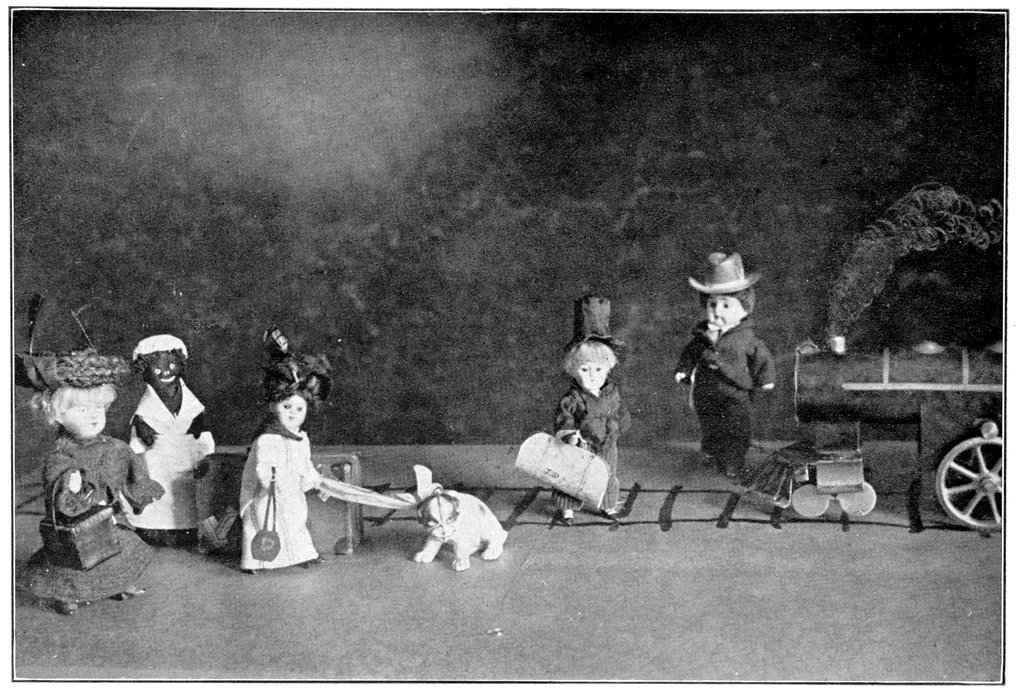
“SOON MR. DELIGHT CAME STRIDING BACK”
35“Woof! Woof!” said Dumpling.
“O here’s a dog,” said the porter, catching hold of Dumpling’s blue ribbon. “No dogs allowed in de Pullman, sah.”
“Dis yeah dog is!” said Dinah, forgetting herself.
“No, miss; all dogs hab to ride in de baggage car.”
“My dear Edith,” said Mr. Delight calmly, “I’ll go and see my friend, the President of the Railroad, and see what can be done.”
“De train will go off and leave you, sah!” cried the distressed porter.
36“No it won’t, William!” shouted Mr. Darling. “I’m going to stand right here with my bag, directly on the track, and the engineer won’t dare to run over me.” And Betsey stood Mr. Darling up, right under the nose of the steaming engine.
Soon Mr. Delight came striding back. “It’s all right,” he called. “The President’s Special will be hitched on directly. Here it comes down the track now.”
Betsey had the biggest passenger car behind her all the time. In fact it was the only car all the little people could get into all at once, and now she pushed it down the track at a great rate and bumped it into the train with a bang quite like a real passenger car.
“It is a shame that it will be too 37late to bathe when we get there,” said Mrs. Delight, as Betsey arranged them all in the tiny green velvet seats.
“It won’t,” corrected Mr. Darling. “Eleven o’clock is the fashionable hour to bathe. The minute I get there I shall put on my bathing-suit. And, Dinah, I shall get enough fish for dinner off the wharf before I touch the water.”
“Better not promise, Mr. John. What if de fishes don’t bite?”
“I promise,” said Mr. Darling more firmly, “that I won’t go into the water until I get enough fish for dinner.”
Here Betsey slowed up the train, and called out in a conductor’s loud voice, “Beachwood! Beachwood!”
“Here we are,” cried Mr. Delight. “What a lovely cottage!”
38But Betsey couldn’t wait for them all to exclaim over the new cottage, having four grown-up people to dress in new bathing-suits, so she began directly with Mr. Delight. She put on his cunning blue bath-robe over his bathing-suit and tied the tiny cord carefully, because Mr. Delight was cold-blooded, like Father. Mrs. Delight had a round rubber cap (not really rubber, though), and Betsey tied Mrs. Darling’s hair up in a white silk bandana with a funny knot in front, like Cousin Margaret’s. As for Mr. Darling, he had a scarlet suit, just the color of a boiled lobster. And Betsey slung the fish-pole over his shoulder, and gave the new camera to Mrs. Darling.
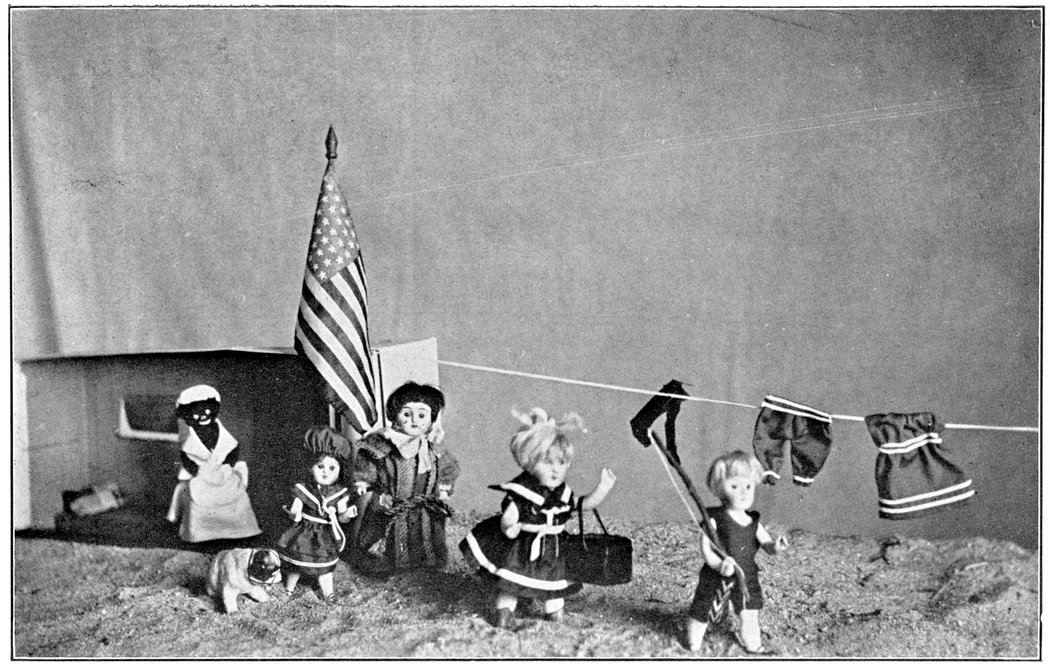
“REMEMBER DE FISH, MR. JOHN,” CALLED DINAH
39“Remember de fish, Mister John,” called Dinah. “Nebber tech de water twell you catches enough fo’ dinner!”
“I’ll bring you the fish, sure!” promised Mr. Darling.
“Here’s the wharf,” said Betsey, putting the big shingle across the bowl. “Mr. Darling can fish while the others try the water.”
“You know the best way to go in, Prudence, I suppose?” said Betsey for Mrs. Delight, settling herself before the table that held the ocean.
“Yes, you wet your forehead first, like this,” said Mrs. Darling, “and then you just plunge in all over like this! O-o-eee!” And Betsey laughed and sputtered just as everyone does at the seashore, giving a monstrous shout for Mr. Delight when he went in.
40“Don’t stir up the water so much down there!” called Mr. Darling from the wharf. “Scared away a big cod, then.”
“I wonder if I could make Mr. Delight swim,” thought Betsey. She bent out his tiny arms and lowered him into the water and tried to make him strike out. But she forgot that she had very carelessly left Mrs. Darling standing in the water, and Mr. Delight was so very awkward and made such a huge wave, that the water in the small ocean struck her full in the face and over she went.
“O her hair! her hair!” cried Betsey in distress, plunging her hand in after the poor little lady. She hastily dried her in a big towel, and took off the little silk cap to see what 41damage was done. “It isn’t so bad,” she decided, feeling of the yellow braid. “The silk made very good rubber. Now Mr. Darling can go in.”
And she plunged him in all over. The other dolls were greatly surprised. “We didn’t know you had caught a fish,” they said.
“Go and look in my fish basket,” said Mr. Darling.
And when they looked in the basket they found two tiny paper blue-fish that Betsey had secretly cut out and hidden there.
“We must take them to Dinah to cook. I am starved,” said Mrs. Delight, climbing out.
Betsey had just about time enough to get the family dry and dressed when Dinah called them to dinner. “It 42will be all right if Mrs. Darling’s hair is down to dry,” decided Betsey. “Cousin Margaret has to dry hers.” And she set them around the table.
“I didn’t know blue-fish grew here,” said Mrs. Delight.
“Pshaw! Don’t let him fool you, honey,” said Dinah scornfully. “I seed him out on de wharf wid de fish man when you-all was busy in de water.”
“He didn’t catch them at all, then,” said Mrs. Delight.
“No,” said Mr. Darling. “But you know I said I’d get the fish; I didn’t promise to catch them.”
And Betsey had to laugh herself to see them laugh. And as she laughed she heard a familiar voice call, “Betsey, dear!”
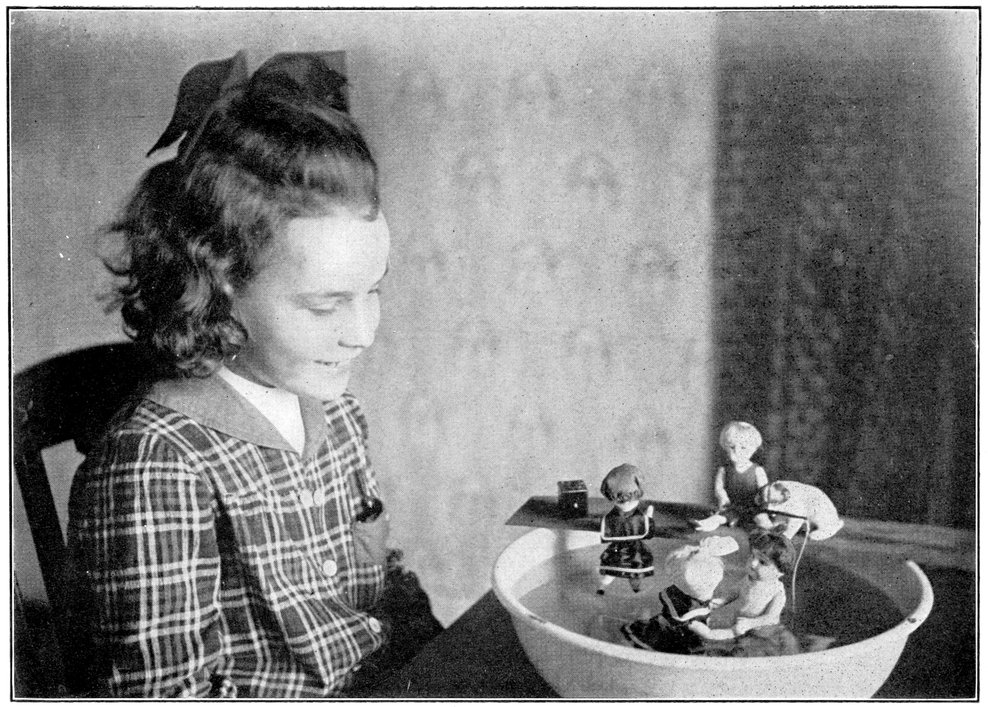
“DON’T STIR UP THE WATER SO MUCH DOWN THERE,” CALLED MR. DARLING
43“Why, mother can’t be home,” she cried.
But she opened the door and it surely was Mother who stood on the landing with her arms out ready for her busy little daughter.
“You may come down and look in my bag,” she said, kissing Betsey.
And when the black bag was opened, Betsey found two tiny boxes for her.
“I know when they’re tiny, they are for Mrs. Delight,” she giggled, as she unwrapped the tissue papers. Inside she found a beautiful little gilt cuckoo-clock with a tiny bird who really said “cuckoo” when you pulled a cord,—and two smooth, silver-framed mirrors.
“Those mirrors,” said Betsey, almost too pleased to speak, “mean 44that Mrs. Delight will have to have a new bureau.”
But it really turned out to mean a great deal more,—which is another story!
“Where is my happy, sunny, good-tempered, busy little daughter Betsey?” asked Mother playfully, one morning.
“She’s ’way inside of me,” said Betsey, dolefully. “So far I can’t find her.”
“What drove her in?” inquired Mother, tossing away her duster and sitting down on the couch.
“I think Mary’s going away to the country drove her in,” replied Betsey, slowly. “She’s going tomorrow and stay five weeks!”
“Why-e-e!” exclaimed Mother. 46“If here isn’t a tear! A great, big, round, wet tear! Whatever shall we do?”
Betsey laughed a little, and wiped her eyes with Mother’s soft handkerchief. “But you see I won’t have anyone to play with,” she said, “and I shall be lonesome.”
“What about Mary?” suggested Mother. “Don’t you think she’ll be lonesome too? Now I think this would be a good plan,—the very first moment you begin to miss Mary, just begin to make something nice to send her.”
“O I think so, too!” cried Betsey.
“Now I see somebody coming back,” declared Mother. “It’s my happy, sunny, good-temp—”
But Betsey began kissing Mother 47so hard that it was impossible for her to finish.
About a week after this, Mr. Betts sat in his shop making an automobile. He had made the biggest part out of a candy box, had covered it smoothly with black oilcloth, and had fastened a fascinating number on the rear,—the very number that was on Father’s own car. But Mr. Betts was having rather a hard time with the head-lights. He was almost on the verge of getting out of patience with the machine, when luckily the mail came. And there was a little letter from Mary.
I miss you dreadfully. I play every minute with Mr. and Mrs. Merrill, and I have made a lovely summer house for them right on the bank of 48the really, truly brook. So they go bathing every day. I wish Edith could make Leslie a visit. Wouldn’t it be great?”
Betsey read the letter through twice. When she came the second time to the sentence, “I wish Edith could make Leslie a visit,” an idea so exciting and pleasant came to her that she laughed and danced a little hornpipe around the room.
“I’ll send her! I’ll put her in a box!” she declared to nobody in particular. “I’ll pack her clothes in a box, and put her in the center so she won’t break, and then I’ll write what every dress is for!” And Betsey dashed down-stairs with the letter to consult with Mother.
Mother liked the exciting idea. She 49even stopped rolling out pink sugar jumbles to find a large shoe-box for Betsey, and some heavy paper and cord. And then what fun it was selecting costumes to send with Mrs. Delight! For this was really going away, not just Make-Believe, although Make-Believe does very well, when one hasn’t a real friend in the country.
Betsey first packed Mrs. Delight’s satin and chiffon evening dresses, her opera cloak, and her outing clothes; her dainty muslins and her frilly night-dress and her pink kimono. Then she dressed Mrs. Delight herself in her green Norfolk suit, settled her in the soft bed, and packed over her white petticoats by the dozen, a woolen blanket for cold nights, sofa pillows, and hats. Then she wrote a letter 50to Mary saying that Mrs. Delight could stay a week, and mailed them together.
Now, to tell the truth, Betsey had been thinking all this time of how pleased Mary would be, and she hadn’t yet thought how lonesome she would be, or how extremely lonesome poor little Mr. Delight would be! And when at last Mr. Betts came back to finish his automobile, it began to dawn on him how quiet his shop was. He laid down the little wheel and looked over at poor Mr. Delight lying on the dining-room floor. And then the dignified carpenter changed suddenly into a very disconsolate little girl. Just at this minute, Betsey was very sorry she had sent Mrs. Delight away.
She ran her fingers through her 51yellow curls and began to think. She thought how sad and lonesome Father had been the year Mother had taken Betsey and Tom on the big ship to England, and how the house looked when they came home again. Not that it was untidy, O no! There was the new piazza, and the grand new music room, and Betsey’s own room done over in soft rose-color and white. And another such brilliant idea popped into Betsey’s head that she laughed aloud.
Mother heard the laugh down in the pantry and smiled, and Norah heard it in the kitchen and grinned broadly. And Joe, the gardener, heard it out in the stables, and laughed too.
“I’ll let Mr. Delight get up a surprise! I can make Mrs. Delight her 52new bureau with my new mirror, and he can order two new bedrooms and a bathroom, if the old bookcase is anywhere near the right size!”
Here Betsey jumped up and ran for the old bookcase as fast as she could go. It was a funny bookcase. Father had “knocked it together” once, in a great hurry. The two shelves did not reach the back of the bookcase at all, which left a space for the books to fall backward in the most bothersome way. But it was lucky for Betsey that Father had left this space, or there would have been no doors between Mr. Delight’s new bedrooms. Betsey laid the bookcase on its side and measured it.
“Did you ever!” she cried. It measured exactly the same as the doll-house.
“So you wish to surprise your wife?” 53said Mr. Betts, cheerfully rubbing his hands as if nothing had happened. He set Mr. Delight comfortably in a little chair on the table.
“I do,” replied Mr. Delight. “We would like to have company, and really need a guest room.”
“The first thing, then,” proceeded Mr. Betts, “is to select wall-paper and clap it on.”
“And for clapping it on,” said Betsey, giggling, “I will need paste.” She skipped down-stairs to see what Mother would think about making paste on baking day. And she had a feeling besides that the pink sugar jumbles might be done.
The jumbles were done, but Mother was nowhere to be seen. “A caller,” said Norah.
54Now, if Norah hadn’t been cross, she would have said, “A caller, me darlint,” and Betsey knew it. She took a delicate bite out of a jumble and began cautiously, “Good deal of cooking going on, isn’t there, Norah?”
“A big sight of it,” agreed Norah. “But it’s me that is equal to it.”
“Norah,” said Betsey suddenly, “do you happen to know how paperhangers make their paste?”
“Flour,” said Norah, “stirred in cold water; then hot water till it’s just right. It’s many the time I’ve made it for me brother Terence.”
“I’m thinking,” said Betsey thoughtfully, “of papering a new room.”
Norah stopped wiping a milk bottle, 55put her hands on her hips, and laughed heartily.
“You’re the cute darlint! Will I be after making ye some paste? Yes, and I will, if the pies never get made!” And kind Norah sifted the flour and stirred and stirred, until she could hand Betsey a bright tin pail full of hot paste as smooth as cream. And when she saw the smile on Betsey’s face, she was thanked enough.
Mr. Betts walked into his shop with his pail, and put on a long-sleeved blue apron. He selected a long paintbrush, and a can of white paint.
“While my paste cools,” he said, “I will begin the marble floor in the bathroom.”
“A marble floor!” exclaimed Mr. Delight. “How extremely rich!”
56“Betsey, Betsey! What on earth do I smell?” called Tom.
“You smell Mr. Delight’s marble floor,” replied Betsey.
“Hum,” said Tom, gazing at the tiny room fast growing white. “Which will you have, right or left?”
“O I love to guess,” cried Betsey. “Right!”
“Better guess right and left,” said Tom, holding out both hands. In one was a white china mustard-boat, and in the other, a half a hollow rubber ball. “I found them out in the rubbish box, and it struck me that the mustard-boat would make a good bathtub,” said Tom.
“And the ball will make a set-bowl!” cried Betsey.
57“Good,” said Tom admiringly. “I never should have thought of a set-bowl. Paint the inside white and set it in a square of cardboard.”
“And I’ll paint the pipe that holds it up with silver,” said Betsey, “and hang one of my new mirrors over it!”
The next day when Betsey was happily doing all these things, the mail came. Such a fat letter as Mary sent! One sheet was from Mrs. Delight to her busy little husband, only she didn’t know he was busy, and thought he must be nearly dead from lonesomeness. And she said at the end of her tiny letter: “I am so afraid that you are lonesome, I have almost decided to come right home.”
Betsey instantly rushed for her doll’s paper and envelopes with Mr. Delight’s 58tiny monogram on them, and wrote as fast as she could, in Mr. Delight’s bold hand-writing,
I am not the least bit lonely, and should feel very badly indeed if you were to cut your visit short. So don’t come until the week is up.
Then she read Mary’s letter. “The dolls are just loads of fun,” Mary wrote. “I have made them a little sleeping-tent beside ours, and they sleep out doors with me, and you were such an old dear to send Mrs. Delight. Hasn’t she the loveliest clothes?”
And just at this moment Betsey was 59very glad indeed that she had sent Mrs. Delight away. But the letter reminded her that Mrs. Delight would be away only three days longer, so she fell to work again.
Such a patient little worker was Betsey! She measured the pretty wall-paper carefully, and pressed out every bubble of paste with a soft cloth, so that her walls were very workmanlike indeed. She always stood Mr. Delight up in his shirt-sleeves in the room she was at work in, to superintend things in general.
Out of a sweet-smelling box that had once held three cakes of soap, Betsey made Mrs. Delight’s green ruffled bed. Then she drew chickens with real ink on the pillow-sham of the guest-room bed, and printed 60BATH-MAT in bright red, in the center of the dear little rug, to be laid beside the new tub.
One morning when Betsey was making up the tiny new beds with the fresh new sheets and embroidered blankets, Tom came up two stairs at a time with a large shoe-box. “Mrs. Delight arrived on this train!” he cried.
“O don’t undo her yet!” pleaded Betsey in great distress. “The house isn’t ready for her to see yet.”
So Tom good-naturedly left the box untouched.
Anxious as Betsey was to see her dearest doll again, she kept steadily at her delightful work arranging furniture, until everything was in readiness. Then she stood Dinah up in 61the dining-room with a tiny pitcher of lemonade, settled Mr. Delight and Dumpling in the new touring-car, and whizzed them away to the station.
Then she unpacked the shoe-box. “How surprised she will be,” sang Betsey, as she burrowed for Mrs. Delight. “Oh, oh! What beautiful new clothes! And Mary made them!” She held up one shimmering dress after another,—one trimmed with tiny beads, and one with embroidery. “Now Mr. Delight can be surprised too!”
And at last she came to the pretty little lady herself. Betsey set her hat straight and stepped her off the train.
“Woof! Woof!” said Dumpling.
“How glad I am,” cried Betsey in Mr. Delight’s deep bass voice.
“O see the new car!” said Mrs. 62Delight’s silvery voice. And Betsey laughed as she lifted the little china dog in beside his mistress.
“How cute they look!” she cried, clapping her hands. Then she whizzed them as fast as she could to the big green house.
“You can go down at once to your room, my dear,” said Mr. Delight.
“You mean up,” said Mrs. Delight.
“No, he mean down, honey,” said Dinah with a welcoming grin.
So Mrs. Delight went down-stairs in great astonishment to find the bright, new rooms. She looked first at her beautiful bed, and then at the bathroom and the guest chamber.
“O William, this is why you didn’t want me to come home. You are the very kindest man in all the world!”
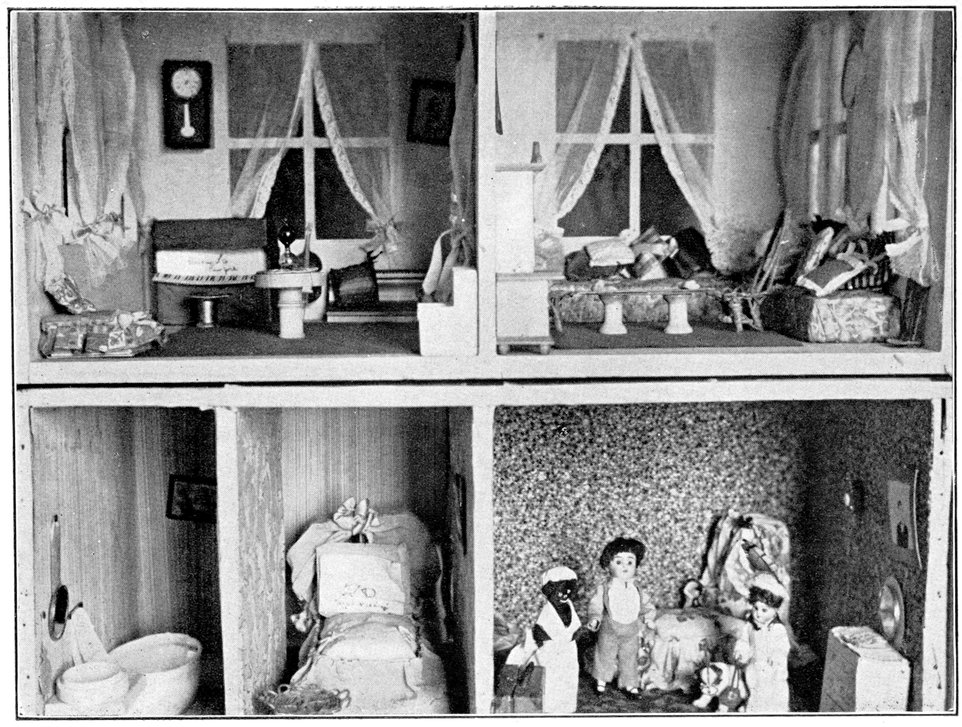
“SO MRS. DELIGHT WENT DOWN IN GREAT ASTONISHMENT TO FIND THE BRIGHT NEW ROOMS”
63And the funniest thing! Although Betsey had done every bit of the work, and Mr. Delight hadn’t done a single thing, she was not the least bit jealous when she went down-stairs to dinner!
“What on earth is Betsey doing with that pail?” asked Cousin Margaret in amazement. She and Mother sat one afternoon in the cool sewing-room as Betsey passed the door lugging a pail of soapsuds.
“Betsey, what are you up to? Cleaning house?” she called, laughing.
“Just so,” replied Betsey, coming back slowly and setting her steaming pail on the floor. “You see, Mrs. Delight’s house needs a thorough cleaning all over before company comes, so today Dinah and Mrs. Delight clean house.”
65“You funny child!” said Cousin Margaret, letting her dainty work fall to the table. “Do you mean to say you really scrub?”
“Scrub!” echoed Betsey, lifting her pail again. “Say, come on up with me and see!”
Cousin Margaret was very young and very pretty, and she really didn’t have the slightest idea how one cleaned a doll-house. So with a little wink at Mother, she followed Betsey up the stairs.
When she saw Betsey’s collection of house-cleaning materials, she sank weakly into a big chair and stared. There was a stiff brush, and a soft brush, and a cake of sapolio; a whole basketful of soft cloths, and a chamois skin.
66“What’s the chamois skin for?” she asked.
“To clean the mirrors,” said Betsey.
“Well, I do declare!” was all Cousin Margaret could say. But pretty soon she leaned forward and began to watch Betsey with a little secret admiration. Mrs. Delight was already dressed in one of her fresh morning dresses, white apron and ruffled sweeping cap, and she and Dinah were supposed to be moving all the furniture into the drawing-room. Mr. Delight sat stiffly on the window-seat and watched.
“You see, Cousin Margaret,” explained Betsey, “Mrs. Delight’s twin sister and her husband are coming to visit. (Those are Anne’s old dolls she 67lets me take.) And Mr. Delight is going to the post-office to mail the invitation. I’ll tell you,—I’ll put him in the car with Dumpling and make Mrs. Delight and Dinah wave to him, and then you can attend to him while I clean house. Water’s getting cold!”
“How stylish and proper he do look,—a-driving dat kerridge!” suddenly observed Betsey in Dinah’s pleasant voice.
“Why, Betsey, how you scared me! I thought you really were another person!” exclaimed Cousin Margaret, looking up from the post-office. But when she once looked up from the post-office she couldn’t look back again, for there was Betsey on her knees, going at the little house with 68the largest scrubbing-brush as if the dirt were inches thick.
“You’ll take the paint off!” screamed Cousin Margaret.
“Take the paint off!” echoed Betsey. “Just see here.” She doubled her cloth over a skewer and began digging out the corners of the little dining-room windows. And when the room was clean enough, she wiped the smooth floor vigorously back and forth with a clean cloth.
“Now see the difference,” she announced, looking first at the clean dining-room and then at the drawing-room.
“Why, the other is actually gray, isn’t it?” said Cousin Margaret, peering in at the little room. “Don’t you want to let me do this one?”
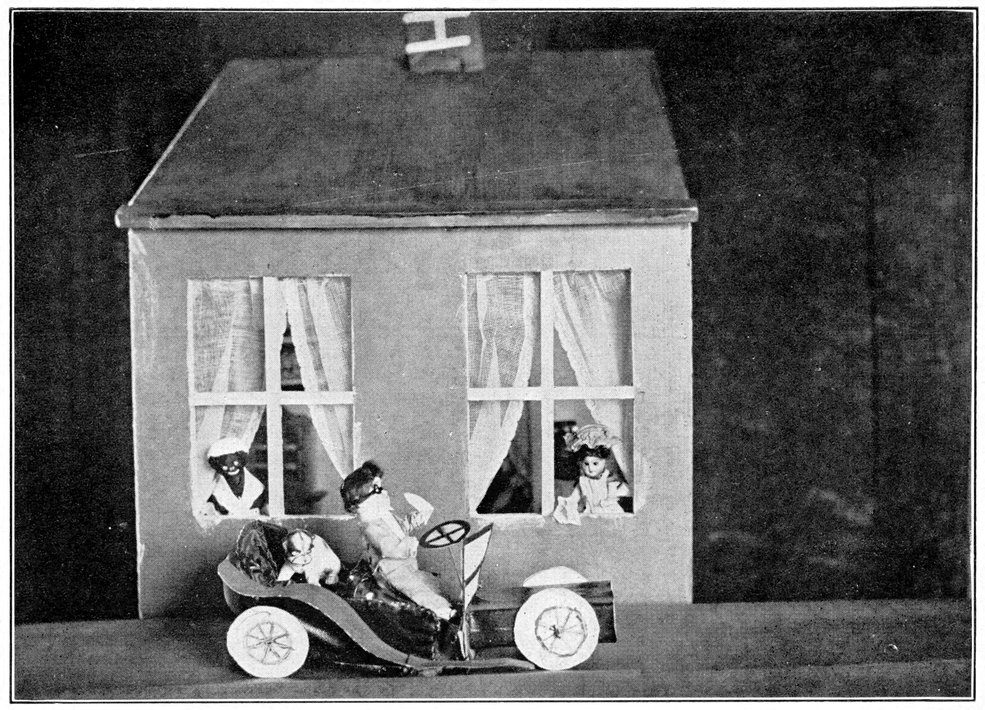
“HE SURE DO LOOK MIGHTY STYLISH A-DRIVING DAT KERRIDGE,” SAID DINAH
69“O thank you!” cried Betsey, seizing the carpets to shake out of the window. So Cousin Margaret promptly began her first house-cleaning. As she polished off the threshold, she heard a gentle thud, thud, over by the desk, so she took her head out of the house to see what was going on. There sat Betsey beating pillows with two of the tiniest little carpet-beaters you ever saw. They were made of twisted wires, exactly like big ones, only so small that they made you laugh to look at them. Cousin Margaret laughed. But she had to own up that the rooms looked very fresh and sweet, as they put back the clean carpets and dusted furniture.
“What does your Mrs. Delight do to entertain her guests?” she asked.
70“I thought they could have a picnic,” said Betsey, pausing a moment to think. “I have a pattern for a dandy lunch-basket. And Tom has the dearest little canoe!”
“Has he, indeed?” observed Tom’s voice around the corner.
“You’ll lend it, won’t you?” pleaded Betsey.
“It makes a good deal of difference what it’s wanted for,” replied Tom, with his hands in his pockets.
“Well, the Delights are going to have a picnic, and they go to a certain grove, like Brighton’s Lake, you know, where they have canoes to rent. And I have everything but the canoe, Tom.”
“Everything?” questioned Tom. “Have you a Thermos bottle?”
71“Hum!” said Cousin Margaret loudly. “I’ll make the Thermos bottles for you,—one quart size, and one pint. I’d love to!”
“How are you going to make them, Cousin Margaret?” asked Tom respectfully.
“If you children will come down street with me, and show me the nearest gum machine,—the kind where the gum is done up in silver paper, you know,—I’ll let you watch me!” bargained Cousin Margaret, determined now to make a perfectly wonderful article.
“What does she want gum for?” giggled Betsey, scurrying down-stairs behind Tom.
“She wants the silver paper,” said Tom wisely.
72And that was exactly what she did want at the time, but when the happy trio stood before the red machine in the grocery store, and the thin stick of gum came shooting out into Cousin Margaret’s hands, she had another idea.
“Come, we’ll buy three sticks, and I’ll hire you to chew one apiece,” she said. “Peel off the silver paper without tearing it.”
“I don’t like gum after the wintergreen flavor goes,” said Betsey, chewing hard.
“You can’t have it anyway,” said Cousin Margaret severely. “Didn’t I buy it for my quart bottle?”
“You’re going to mold it!” cried Betsey, skipping along the sidewalk. “Aren’t you clever!”
Mother smiled when she saw them 73go upstairs again, and she went quietly out to the pantry without saying a word.
Cousin Margaret sat down at Mr. Betts’ work-table with a mighty puff. She smoothed away on the bright tin-foil until it shone like solid silver. Then she molded her soft chewing-gum carefully into a tiny pint bottle. She clipped off a long strip of tin-foil and wound it around the bottle, pinched the top a little, and glued on a paper label.
“Keeps cold twenty-four hours!” she cried, holding it out for inspection.
“Good!” shouted Tom and Betsey.
“Hand over your gum, children,” said Cousin Margaret. “It takes two for a quart. You can be making the lunch-basket.”
74“Weren’t you going to play tennis this afternoon?” asked Betsey thoughtfully. “Mother said I mustn’t bother you.”
“I was, but I’m not,” replied Cousin Margaret recklessly. “I’d rather play picnic, and sail your canoe in the bathtub.”
Tom slipped quietly down-stairs at mention of the bathtub, and neither the little girl nor the big girl noticed.
“O William, here come Prudence and John!” cried Cousin Margaret in Mrs. Delight’s silvery voice, rushing Mrs. Delight to the front door.
“Here we are!” shouted Betsey for Mr. Darling. “It’s so much fun to have somebody else manage all these dolls, Cousin Margaret!”
“Suppose you manage the Delights,” 75suggested Cousin Margaret in an undertone, “and let me have the company.”
“I’d rather,” said Betsey, joyfully, taking charge at once of Mr. Delight, who was not helping his guests properly.
“Keep your dog off!” said Cousin Margaret, making Mr. Darling rush at Dumpling in the most ridiculous manner.
“Are you tired, Prudence?” asked Mrs. Delight.
“Tired? No!” said Mrs. Darling.
Betsey made Mr. and Mrs. Delight look at each other.
“Why, what’s up?” questioned Mr. Darling, sitting down on the tiny piano stool.
“We thought,” began Betsey in 76Mrs. Delight’s most charming manner, “that we might go on a picnic.”
“Hoo-ray!” cried Cousin Margaret, making Mr. Darling turn a splendid handspring across the little parlor.
“Why, John, I am ashamed of you,” said Betsey, sternly, for his wife, and trying in vain to stop laughing.
“I brought my camera that has legs,” said Mr. Darling, “and I’ll take your pictures.”
“We haven’t really a camera with legs, have we?” whispered Betsey.
“Down in my trunk,” said Cousin Margaret. “You begin to dress them in picnic clothes, and I’ll get it. I meant to save it until I went home, but I know you’d rather have it now.” She struggled to her feet, and left Betsey tying a soft blue ribbon around Mrs. Delight’s fluffy head. The camera proved to be a fascinating tin one, with a front part that pulled in and out beautifully.
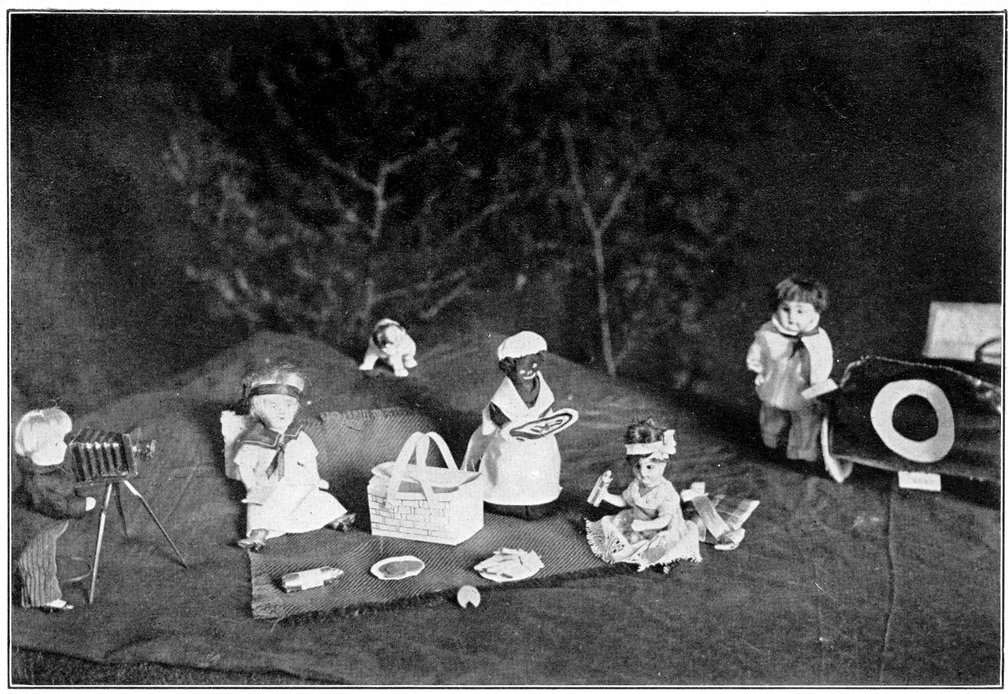
“TAKE UP A SANDWICH AND LOOK PLEASANT,” SAID MR. DARLING
77“Let’s hurry. I’m hungry already!” said Cousin Margaret, piling everything into the little touring-car,—basket, dog, Dinah, and shawls, helter-skelter. The car whizzed around the room a few times, and stopped with a jolt at the picnic grounds.
“Spread the shawl on the ground about here,” directed Mrs. Delight, pointing with the tip of her slipper to a little clearing. “Strew the cushions around, and—”
“Open up the lunch!” interrupted Mr. Darling, setting up his camera. “I don’t want to take my picture 78until the eating begins, and the sun is about right now.”
“His old picture is just an excuse to eat”, remarked Mrs. Darling.
“Better give de ole dog sump’in to eat. Den he won’t be boddering so much,” said Dinah.
“Well, let me see,—he’s had twelve cookies,” reflected Mrs. Delight. “Give him three more and let him go over on that little hill to eat them.”
“Can’t he hab apple dumpling?” asked Dinah anxiously.
“Give Dumpling Delight a delightful dumpling,” sang Mr. Darling. “Now, all ready! Take up a sandwich, Mrs. D., and look pleasant!”
“Now let’s take them down to the lake,” suggested Betsey, poking the last crumb under Dumpling’s muzzle.
79When they reached the big, white-tiled bathroom, they found the bathtub filled with water, a wharf across it, and a beautiful, dark green sailboat floating gracefully up and down with the waves. And the waves were so very lively that it seemed as if someone must be quite near. Betsey glanced behind the door.
“O here’s the Mr. Wind that made the waves,” she said gaily, pulling Tom down to the lake.
“Will somebody kindly notice the boat-house?” said Tom, kneeling down good-naturedly.
There was a plank across the tub, wide enough to drive the little motorcar along, and at the further end stood a tiny cardboard ticket-window. Behind the little bars, made of toothpicks, 80stood a paper ticket-man in a blue cap. And overhead was printed:
“Isn’t that grand?” cried Cousin Margaret. “We can afford the green sailboat as long as the Delights are millionaires.”
Tom grinned, and watched the big girl and the little girl seat the happy dolls safely in the big boat. And when it was finally untied and sailed slowly off down the lake, it looked exactly like a real boat party of sober grown-up people.
“It actually made me sort of hungry,” said Cousin Margaret at last, “to see them eat at the picnic. Let’s go down and get a gingersnap.”
81Tom grinned again. “Mother said when you were through playing, to come to her upstairs piazza.”
With one accord the two girls carefully placed the picnic party safely on the wharf and skipped for the piazza. There sat Mother, in her prettiest company dress of soft white crêpe, smiling at nobody in particular, but looking at the green wicker tea-table.
“Wow!” cried Tom. “If Dumpling were here, he’d say ‘Woof!’”
On the tea-table were pink plates of thin sandwiches, and a huge glass pitcher of strawberry-ade with real strawberries floating in it.
“I wish you would pour, Margaret,” said Mother, smiling.
So Cousin Margaret, with a sly wink at Betsey, took her place very sedately 82and poured the frosty glasses full, and passed the sandwiches. And she did it so very well, and with such a grown-up air, that Betsey wondered how in the world Cousin Margaret could be a little girl so easily.
Betsey was sitting on the slippery couch looking quite serious. She was not Mr. Betts today, nor even Dr. Betson. She was just a little girl with a sore throat, watching the big, real Dr. Lawrence as he rummaged around in his black bag. He put up his uncomfortable glass spoon that he pressed down one’s tongue with, and fished out an oblong pasteboard box.
“Oh!” said Betsey.
Dr. Lawrence looked up quickly. “Why do you say ‘Oh!’ Sister?” he asked.
Betsey’s eyes were fastened on the 84little box. “It’s just the shape of a Victrola,” she said.
“Hmmmm!” buzzed the big doctor, taking the cover off and dropping in some tiny pink tablets and some large white ones. “If you will take a white pill every hour, and gargle a pink one (dissolved in water, of course) every half hour, you shall have the box! And——hullo! Here’s a bit of wire just about right for a crank! Now, Mr. Tom, we’ll do up your burned thumb.”
Tom had been experimenting a little too much with Norah’s teakettle and the steam had made quite a big blister. Dr. Lawrence unrolled a sheet of pure white absorbent cotton.
“Oh!” said Betsey.
“Now, deary me!” cried Dr. 85Lawrence, pretending to be quite put out. “I suppose the child wants my cotton, too. Mr. Avery, make Betsey stop saying ‘Oh!’ I won’t have a thing left to give the little girl down the road, if this child takes all my pills, and boxes, and wire,—and now my cotton!”
Betsey slipped off the couch and danced around happily. She loved to hear Dr. Lawrence joke. “It makes such perfectly beautiful snow,” she said. “And just imagine my little automobile plowing along in it, making wheel-ruts just like yours.”
“Well, I suppose you’ll have to have it,” said Dr. Lawrence, resignedly. “I’ll charge your father for it, though,—see if I don’t. And poor Tom what will he do?”
86“O you can have enough for his thumb,” said Betsey.
“Hmmmm!” buzzed on the doctor, winding away. “Down the road is a little girl nine years old. She has three dolls, and they’re about as long as Tom’s thumb.”
“Tom Thumb!” interrupted Betsey.
“Yes’m,” laughed Dr. Lawrence. “Well, this little girl Molly has a lame knee,—a very lame knee, and I had to send her to bed for a month.”
“A month!” echoed Betsey.
“Does it seem long to you?” asked Dr. Lawrence thoughtfully. “That’s just how it seems to her.”
“Does Molly play with her dolls?” asked Betsey.
“Yes, she sews for them, but they each need a party dress.”
87“Can’t she make party dresses?”
“O yes, she can, if she has the proper materials. Now, you see a party dress requires some thin sort of fuzzy cloth——”
“You don’t mean fuzzy, Dr. Lawrence,” interrupted Betsey, smiling. “You mean soft and drapey.”
“That’s it. I see you know what a party dress is made of. And perhaps some ribbons and a little piece of lace. How about that?”
Betsey crossed the room, took one of the doctor’s big hands in both hers and gave it a hard squeeze. “I think you’re a perfectly lovely doctor, and I saw just what you were driving at all the time. And don’t you dare to go before I come back.”
And she went directly to the playroom, 88opened Madame Bettina’s box of cloth, and looked over its contents. She finally selected a dainty rosebud muslin with a pink border, a thin dimity covered with wreaths of tiny forget-me-nots, and a pretty yellow voile. She pulled out a length of baby ribbon to match each dress, and a handful of soft lace, and folded the whole carefully in white tissue-paper. Then she went down-stairs with such a sudden thought in her curly head that she sang a little tune all the way.
She burst into the library with her little parcel to find Dr. Lawrence talking and laughing with Father, and putting on his big fur coat.
“What’s up?” he asked, catching sight of Betsey’s shining face.
“Could you wait a minute?” 89begged Betsey. “You see, Mr. and Mrs. Delight are going to have a Christmas tree and invite some poor little children. And I want to write an invitation to Molly’s three dolls! She could send the dolls over by you when you come this afternoon, and perhaps I can take them back myself tomorrow.”
“Good enough!” said the doctor good-naturedly, sliding out of his coat again. “Molly will be so glad she won’t know what to do. I’ll wait.”
Betsey climbed in haste into the big desk chair and wrote carefully on her blue notepaper:

90And on the little blue envelope she wrote, “For Molly’s three dolls.”
“I will deliver it directly,” said Dr. Lawrence, “and this afternoon I will bring the company.” And he blew a kiss to Betsey for thanks.
The moment the doctor had gone, Mr. Betts went to his shop and began on his Victrola, for this was to be Mr. Delight’s present to his wife. Mr. Betts cut the slender legs with a sharp penknife and bent out the tiny doors. Then he pasted shiny dark-red paper all over the outside and pushed in the crank.
“It almost looks as if it would play,” declared Betsey. Then she took a white pill and gargled a pink one, for she always kept her promise. Then all was ready.
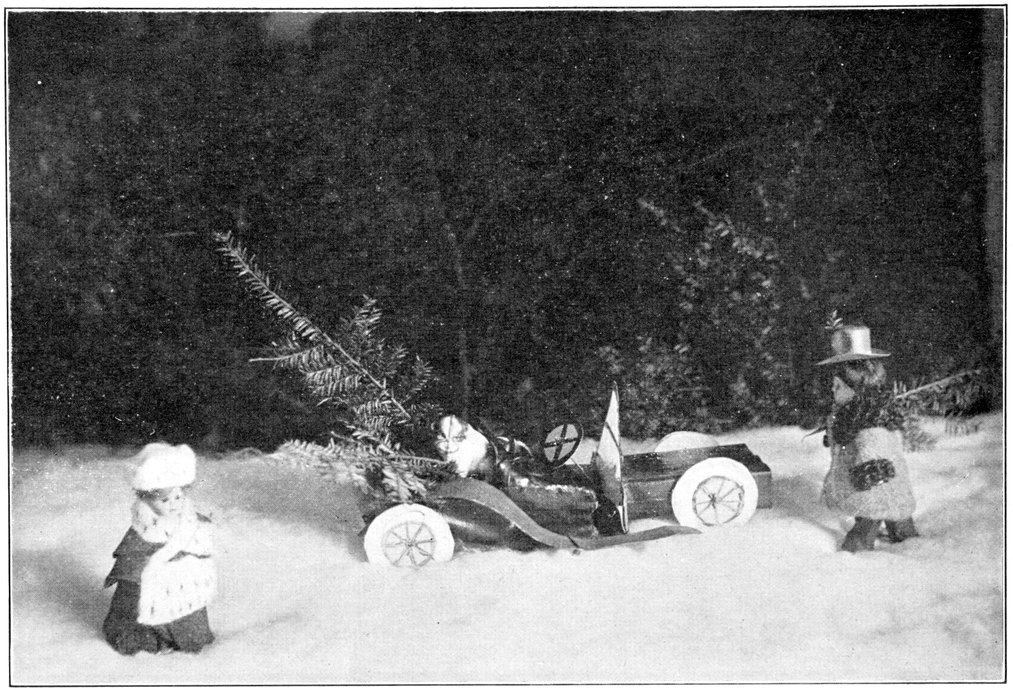
“HE LEFT A PRINT OF EACH TINY FOOTSTEP”
91“O William!” said Mrs. Delight, sitting down on the gilt sofa beside her husband, “don’t you think we could get the Christmas tree ourselves?”
“Indeed we could! Put on your long coat and furs, and I will bring the car around, and we will find one.” Betsey spread out the soft white snow for the forest, and dressed Mr. Delight in his gray fox coat with its curly black collar. Then she put on Mrs. Delight’s long brown coat and fastened up her lovely ermine furs. “The little darling!” she said, kissing her, and settling both the little dolls in the automobile.
The car did make a fascinating rut in the snow, and when Betsey walked Mr. Delight over to the hemlock trees he left a print of each tiny footstep.
92Whang! Whang! resounded his tiny axe. Finally the tree toppled over with a delightful thud,—it was only the very tip of Betsey’s real tree which stood down-stairs ready for lighting.
“O the sweet little tree!” cried Betsey, seizing it, and, I am sorry to say, leaving the little couple stranded in the forest.
“I’ll set it in one of my wooden circles that seam-binding comes on, and cover it with green crêpe paper.”
First she cleared all the furniture out of the little drawing-room and set up the tree. Then she began to wind her shining tinsel and paper chains around it, and hung on her dazzling, colored glass balls, blue and red, and green and gold. And then she hung presents by the dozen on it. A tiny 93rocking-horse and a sled, she had to place at the foot of the tree.
“You poor things!” she exclaimed at last, catching sight of Mr. Delight lying on his back in the snow. “You must come and get dressed in time for your own party.”
“I think, William,” began Mrs. Delight enthusiastically, “that I will wear my blue accordion-plaited crêpe-de-chine.”
“And I will wear my dress-suit,” said Mr. Delight, as Betsey slipped his tiny cuffs up his sleeves.
“You can stand here,” said Betsey, setting up the host and hostess by the little Victrola, “and then you will be all ready when the children arrive.”
And she went down to get ready herself.
94“Don’t you think it would be nice, Betsey,” said Mother, as she buttoned Betsey’s blue cashmere dress, “if you should make a few clothes for Molly’s children? Just some odd things like a kimono or a sweater?”
“I’m going to,” said Betsey happily, nodding her curly head. “I have an old gray golf-glove that I can make a sweater of,——the wrist for the sweater part, and two fingers for the sleeves.”
“That’s my kind daughter,” said Mother, approvingly. “Now run down and let the doctor in.”
“Here are those three children!” cried Dr. Lawrence, holding out a square box. “Please hurry and take them! Bless me! I didn’t take a minute’s comfort for fear I should smash 95them to bits! Can I come to the party? How’s the throat?”
Betsey laughed at his list of questions and opened her mouth obediently.
“Fine! Fine!” said the doctor, peering at the throat over his spectacles. “Christmas day will find you as well as ever. Now, for that, can’t I come to the party?”
“If you’d like to,” said Betsey, her eyes dancing, for she knew that Dr. Lawrence would make the best playmate a little girl ever had. And she led the way with Molly’s dolls, all dressed in the new party dresses, made since morning by the delighted Molly,—every stitch by hand.
“Well, what a fine man your Mr. Delight is!” declared Dr. Lawrence, 96sitting down heavily in the big chair before the doll-house.
“He is. He doesn’t drink or smoke,—just like Father, you know,” said Betsey.
“I should know that to look at him,” said Dr. Lawrence. “And what a pretty little wife he has, to be sure!”
“Here come the children, William,” cried Betsey in Mrs. Delight’s sweet voice.
“Yes, yes, my dear!” boomed Dr. Lawrence hastily, taking a tiny Dutch boy and a Kewpie doll out of his pocket. “I found two more poor children, Edith, and brought them along. They live in the alley!”
“O lovely!” said Betsey, admiring the Kewpie’s white fur suit. “Let’s show them the tree the very first thing.”
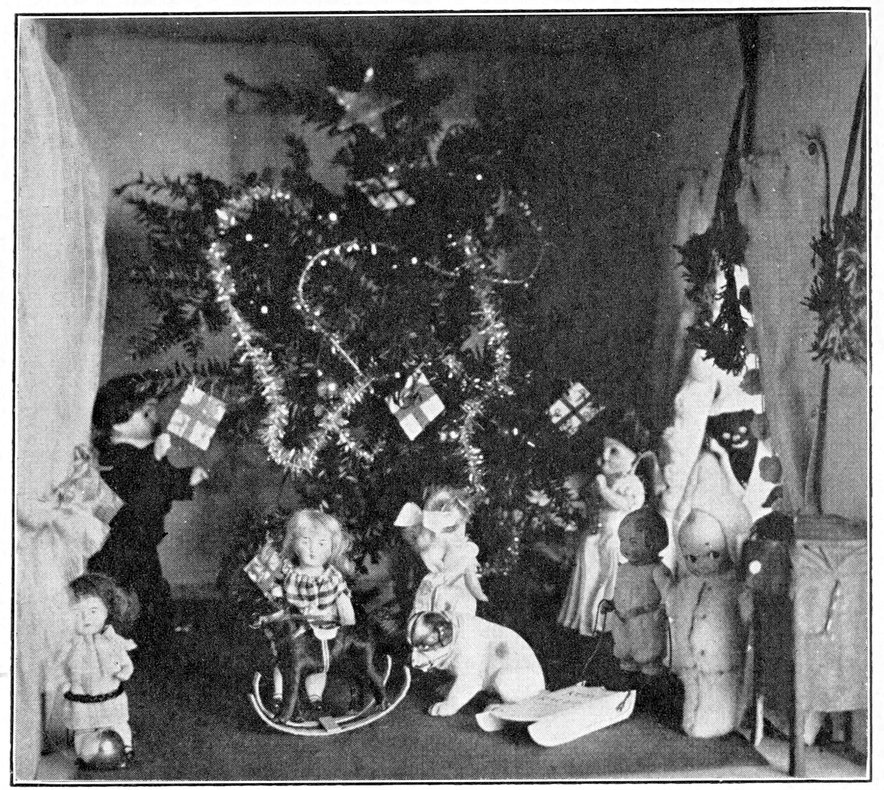
“DINNER AM SERVED, SAH,” DRAWLED DR. LAWRENCE, POKING DINAH’S HEAD BETWEEN THE PINK PORTIÈRES
97And as the children stood speechless around the tree, Betsey and her playmate untied parcel after parcel, introduced the Dutch boy to his new sled, and laughed to hear Dumpling growl at the rocking-horse.
“Dinner am served, sah,” drawled Dr. Lawrence, poking Dinah’s head between the pink portières.
“Get into line, then, children,” giggled Betsey, “and march into the dining-room.”
Eight dolls are quite a handful for even two people to attend to, but Betsey and the doctor finally managed to seat the five children around the big table and get them all waited upon by Dinah and Mrs. Delight. Betsey 98had made a big paper brick of ice cream, made up of tiny cubes of different colors, exactly like the big one that was waiting down-stairs for her own Christmas dinner.
“You’re a mighty good cook, missus!” piped up Dr. Lawrence for the Kewpie, rolling his eyes at Dinah. Just then the nursery clock struck four.
“Bless my soul! I must go!” shouted Dr. Lawrence, getting up in a great rush and nearly upsetting the whole house.
“O I’m sorry!” said Betsey, following him down-stairs,—“but I’m very much obliged for this short call. And tomorrow can I go and take Molly’s dolls back to her?”
“I think you may. If you gargle, you know.”
99The two entered the library where Father and Mother were seated.
“I never saw a little girl in all my life,” said Dr. Lawrence to nobody in particular, “who played so charmingly with her dolls. Now I have a little niece who had the greatest doll-house last Christmas that you ever laid eyes on. It was just perfect. Little marble-topped tables, and desk telephones, and clothes—! Why, her dolls had so many clothes they didn’t know what to do. And all made,—every one of ’em,—all finished. I never used to understand why she didn’t play with ’em. And now,”—he made a low bow to Betsey,—“now I know.”
“Because she didn’t have anything to make?” questioned Betsey.
100“Exactly so,” said Dr. Lawrence. “Elise had nothing to do but dress and undress those dolls. She couldn’t talk for them because there was nothing to say. In fact, I’d like to give a perfectly bare doll-house to every little girl I know. I wouldn’t give her a single piece of furniture, or any money to buy it with, either.”
“Betsey has had just a dollar this year for baby ribbon and tissue-paper and white cardboard,” remarked Mrs. Avery with a smile.
“Well, then, for only a dollar,” replied Dr. Lawrence, “you are learning many good lessons, Mistress Betsey, with your sewing and carpentering, and laying rugs. And I hope you will play dolls until you’re quite grown up!”
101And now (this being a true story), if you would like to know how old Betsey was when she finally covered up the House of Delight, and packed away her dear little dolls, just turn this page and hunt for a tiny figure hidden in one corner!
***END OF THE PROJECT GUTENBERG EBOOK THE HOUSE OF DELIGHT***
******* This file should be named 62714-h.htm or 62714-h.zip *******
This and all associated files of various formats will be found in:
http://www.gutenberg.org/6/2/7/1/62714
Updated editions will replace the previous one--the old editions will be renamed.
Creating the works from print editions not protected by U.S. copyright law means that no one owns a United States copyright in these works, so the Foundation (and you!) can copy and distribute it in the United States without permission and without paying copyright royalties. Special rules, set forth in the General Terms of Use part of this license, apply to copying and distributing Project Gutenberg-tm electronic works to protect the PROJECT GUTENBERG-tm concept and trademark. Project Gutenberg is a registered trademark, and may not be used if you charge for the eBooks, unless you receive specific permission. If you do not charge anything for copies of this eBook, complying with the rules is very easy. You may use this eBook for nearly any purpose such as creation of derivative works, reports, performances and research. They may be modified and printed and given away--you may do practically ANYTHING in the United States with eBooks not protected by U.S. copyright law. Redistribution is subject to the trademark license, especially commercial redistribution.
To protect the Project Gutenberg-tm mission of promoting the free distribution of electronic works, by using or distributing this work (or any other work associated in any way with the phrase "Project Gutenberg"), you agree to comply with all the terms of the Full Project Gutenberg-tm License available with this file or online at www.gutenberg.org/license.
1.A. By reading or using any part of this Project Gutenberg-tm electronic work, you indicate that you have read, understand, agree to and accept all the terms of this license and intellectual property (trademark/copyright) agreement. If you do not agree to abide by all the terms of this agreement, you must cease using and return or destroy all copies of Project Gutenberg-tm electronic works in your possession. If you paid a fee for obtaining a copy of or access to a Project Gutenberg-tm electronic work and you do not agree to be bound by the terms of this agreement, you may obtain a refund from the person or entity to whom you paid the fee as set forth in paragraph 1.E.8.
1.B. "Project Gutenberg" is a registered trademark. It may only be used on or associated in any way with an electronic work by people who agree to be bound by the terms of this agreement. There are a few things that you can do with most Project Gutenberg-tm electronic works even without complying with the full terms of this agreement. See paragraph 1.C below. There are a lot of things you can do with Project Gutenberg-tm electronic works if you follow the terms of this agreement and help preserve free future access to Project Gutenberg-tm electronic works. See paragraph 1.E below.
1.C. The Project Gutenberg Literary Archive Foundation ("the Foundation" or PGLAF), owns a compilation copyright in the collection of Project Gutenberg-tm electronic works. Nearly all the individual works in the collection are in the public domain in the United States. If an individual work is unprotected by copyright law in the United States and you are located in the United States, we do not claim a right to prevent you from copying, distributing, performing, displaying or creating derivative works based on the work as long as all references to Project Gutenberg are removed. Of course, we hope that you will support the Project Gutenberg-tm mission of promoting free access to electronic works by freely sharing Project Gutenberg-tm works in compliance with the terms of this agreement for keeping the Project Gutenberg-tm name associated with the work. You can easily comply with the terms of this agreement by keeping this work in the same format with its attached full Project Gutenberg-tm License when you share it without charge with others.
1.D. The copyright laws of the place where you are located also govern what you can do with this work. Copyright laws in most countries are in a constant state of change. If you are outside the United States, check the laws of your country in addition to the terms of this agreement before downloading, copying, displaying, performing, distributing or creating derivative works based on this work or any other Project Gutenberg-tm work. The Foundation makes no representations concerning the copyright status of any work in any country outside the United States.
1.E. Unless you have removed all references to Project Gutenberg:
1.E.1. The following sentence, with active links to, or other immediate access to, the full Project Gutenberg-tm License must appear prominently whenever any copy of a Project Gutenberg-tm work (any work on which the phrase "Project Gutenberg" appears, or with which the phrase "Project Gutenberg" is associated) is accessed, displayed, performed, viewed, copied or distributed:
This eBook is for the use of anyone anywhere in the United States and most other parts of the world at no cost and with almost no restrictions whatsoever. You may copy it, give it away or re-use it under the terms of the Project Gutenberg License included with this eBook or online at www.gutenberg.org. If you are not located in the United States, you'll have to check the laws of the country where you are located before using this ebook.
1.E.2. If an individual Project Gutenberg-tm electronic work is derived from texts not protected by U.S. copyright law (does not contain a notice indicating that it is posted with permission of the copyright holder), the work can be copied and distributed to anyone in the United States without paying any fees or charges. If you are redistributing or providing access to a work with the phrase "Project Gutenberg" associated with or appearing on the work, you must comply either with the requirements of paragraphs 1.E.1 through 1.E.7 or obtain permission for the use of the work and the Project Gutenberg-tm trademark as set forth in paragraphs 1.E.8 or 1.E.9.
1.E.3. If an individual Project Gutenberg-tm electronic work is posted with the permission of the copyright holder, your use and distribution must comply with both paragraphs 1.E.1 through 1.E.7 and any additional terms imposed by the copyright holder. Additional terms will be linked to the Project Gutenberg-tm License for all works posted with the permission of the copyright holder found at the beginning of this work.
1.E.4. Do not unlink or detach or remove the full Project Gutenberg-tm License terms from this work, or any files containing a part of this work or any other work associated with Project Gutenberg-tm.
1.E.5. Do not copy, display, perform, distribute or redistribute this electronic work, or any part of this electronic work, without prominently displaying the sentence set forth in paragraph 1.E.1 with active links or immediate access to the full terms of the Project Gutenberg-tm License.
1.E.6. You may convert to and distribute this work in any binary, compressed, marked up, nonproprietary or proprietary form, including any word processing or hypertext form. However, if you provide access to or distribute copies of a Project Gutenberg-tm work in a format other than "Plain Vanilla ASCII" or other format used in the official version posted on the official Project Gutenberg-tm web site (www.gutenberg.org), you must, at no additional cost, fee or expense to the user, provide a copy, a means of exporting a copy, or a means of obtaining a copy upon request, of the work in its original "Plain Vanilla ASCII" or other form. Any alternate format must include the full Project Gutenberg-tm License as specified in paragraph 1.E.1.
1.E.7. Do not charge a fee for access to, viewing, displaying, performing, copying or distributing any Project Gutenberg-tm works unless you comply with paragraph 1.E.8 or 1.E.9.
1.E.8. You may charge a reasonable fee for copies of or providing access to or distributing Project Gutenberg-tm electronic works provided that
1.E.9. If you wish to charge a fee or distribute a Project Gutenberg-tm electronic work or group of works on different terms than are set forth in this agreement, you must obtain permission in writing from both the Project Gutenberg Literary Archive Foundation and The Project Gutenberg Trademark LLC, the owner of the Project Gutenberg-tm trademark. Contact the Foundation as set forth in Section 3 below.
1.F.
1.F.1. Project Gutenberg volunteers and employees expend considerable effort to identify, do copyright research on, transcribe and proofread works not protected by U.S. copyright law in creating the Project Gutenberg-tm collection. Despite these efforts, Project Gutenberg-tm electronic works, and the medium on which they may be stored, may contain "Defects," such as, but not limited to, incomplete, inaccurate or corrupt data, transcription errors, a copyright or other intellectual property infringement, a defective or damaged disk or other medium, a computer virus, or computer codes that damage or cannot be read by your equipment.
1.F.2. LIMITED WARRANTY, DISCLAIMER OF DAMAGES - Except for the "Right of Replacement or Refund" described in paragraph 1.F.3, the Project Gutenberg Literary Archive Foundation, the owner of the Project Gutenberg-tm trademark, and any other party distributing a Project Gutenberg-tm electronic work under this agreement, disclaim all liability to you for damages, costs and expenses, including legal fees. YOU AGREE THAT YOU HAVE NO REMEDIES FOR NEGLIGENCE, STRICT LIABILITY, BREACH OF WARRANTY OR BREACH OF CONTRACT EXCEPT THOSE PROVIDED IN PARAGRAPH 1.F.3. YOU AGREE THAT THE FOUNDATION, THE TRADEMARK OWNER, AND ANY DISTRIBUTOR UNDER THIS AGREEMENT WILL NOT BE LIABLE TO YOU FOR ACTUAL, DIRECT, INDIRECT, CONSEQUENTIAL, PUNITIVE OR INCIDENTAL DAMAGES EVEN IF YOU GIVE NOTICE OF THE POSSIBILITY OF SUCH DAMAGE.
1.F.3. LIMITED RIGHT OF REPLACEMENT OR REFUND - If you discover a defect in this electronic work within 90 days of receiving it, you can receive a refund of the money (if any) you paid for it by sending a written explanation to the person you received the work from. If you received the work on a physical medium, you must return the medium with your written explanation. The person or entity that provided you with the defective work may elect to provide a replacement copy in lieu of a refund. If you received the work electronically, the person or entity providing it to you may choose to give you a second opportunity to receive the work electronically in lieu of a refund. If the second copy is also defective, you may demand a refund in writing without further opportunities to fix the problem.
1.F.4. Except for the limited right of replacement or refund set forth in paragraph 1.F.3, this work is provided to you 'AS-IS', WITH NO OTHER WARRANTIES OF ANY KIND, EXPRESS OR IMPLIED, INCLUDING BUT NOT LIMITED TO WARRANTIES OF MERCHANTABILITY OR FITNESS FOR ANY PURPOSE.
1.F.5. Some states do not allow disclaimers of certain implied warranties or the exclusion or limitation of certain types of damages. If any disclaimer or limitation set forth in this agreement violates the law of the state applicable to this agreement, the agreement shall be interpreted to make the maximum disclaimer or limitation permitted by the applicable state law. The invalidity or unenforceability of any provision of this agreement shall not void the remaining provisions.
1.F.6. INDEMNITY - You agree to indemnify and hold the Foundation, the trademark owner, any agent or employee of the Foundation, anyone providing copies of Project Gutenberg-tm electronic works in accordance with this agreement, and any volunteers associated with the production, promotion and distribution of Project Gutenberg-tm electronic works, harmless from all liability, costs and expenses, including legal fees, that arise directly or indirectly from any of the following which you do or cause to occur: (a) distribution of this or any Project Gutenberg-tm work, (b) alteration, modification, or additions or deletions to any Project Gutenberg-tm work, and (c) any Defect you cause.
Project Gutenberg-tm is synonymous with the free distribution of electronic works in formats readable by the widest variety of computers including obsolete, old, middle-aged and new computers. It exists because of the efforts of hundreds of volunteers and donations from people in all walks of life.
Volunteers and financial support to provide volunteers with the assistance they need are critical to reaching Project Gutenberg-tm's goals and ensuring that the Project Gutenberg-tm collection will remain freely available for generations to come. In 2001, the Project Gutenberg Literary Archive Foundation was created to provide a secure and permanent future for Project Gutenberg-tm and future generations. To learn more about the Project Gutenberg Literary Archive Foundation and how your efforts and donations can help, see Sections 3 and 4 and the Foundation information page at www.gutenberg.org.
The Project Gutenberg Literary Archive Foundation is a non profit 501(c)(3) educational corporation organized under the laws of the state of Mississippi and granted tax exempt status by the Internal Revenue Service. The Foundation's EIN or federal tax identification number is 64-6221541. Contributions to the Project Gutenberg Literary Archive Foundation are tax deductible to the full extent permitted by U.S. federal laws and your state's laws.
The Foundation's principal office is in Fairbanks, Alaska, with the mailing address: PO Box 750175, Fairbanks, AK 99775, but its volunteers and employees are scattered throughout numerous locations. Its business office is located at 809 North 1500 West, Salt Lake City, UT 84116, (801) 596-1887. Email contact links and up to date contact information can be found at the Foundation's web site and official page at www.gutenberg.org/contact
For additional contact information:
Dr. Gregory B. Newby
Chief Executive and Director
gbnewby@pglaf.org
Project Gutenberg-tm depends upon and cannot survive without wide spread public support and donations to carry out its mission of increasing the number of public domain and licensed works that can be freely distributed in machine readable form accessible by the widest array of equipment including outdated equipment. Many small donations ($1 to $5,000) are particularly important to maintaining tax exempt status with the IRS.
The Foundation is committed to complying with the laws regulating charities and charitable donations in all 50 states of the United States. Compliance requirements are not uniform and it takes a considerable effort, much paperwork and many fees to meet and keep up with these requirements. We do not solicit donations in locations where we have not received written confirmation of compliance. To SEND DONATIONS or determine the status of compliance for any particular state visit www.gutenberg.org/donate.
While we cannot and do not solicit contributions from states where we have not met the solicitation requirements, we know of no prohibition against accepting unsolicited donations from donors in such states who approach us with offers to donate.
International donations are gratefully accepted, but we cannot make any statements concerning tax treatment of donations received from outside the United States. U.S. laws alone swamp our small staff.
Please check the Project Gutenberg Web pages for current donation methods and addresses. Donations are accepted in a number of other ways including checks, online payments and credit card donations. To donate, please visit: www.gutenberg.org/donate
Professor Michael S. Hart was the originator of the Project Gutenberg-tm concept of a library of electronic works that could be freely shared with anyone. For forty years, he produced and distributed Project Gutenberg-tm eBooks with only a loose network of volunteer support.
Project Gutenberg-tm eBooks are often created from several printed editions, all of which are confirmed as not protected by copyright in the U.S. unless a copyright notice is included. Thus, we do not necessarily keep eBooks in compliance with any particular paper edition.
Most people start at our Web site which has the main PG search facility: www.gutenberg.org
This Web site includes information about Project Gutenberg-tm, including how to make donations to the Project Gutenberg Literary Archive Foundation, how to help produce our new eBooks, and how to subscribe to our email newsletter to hear about new eBooks.